Haechi: Episodes 47-48 (Final)
by LollyPip
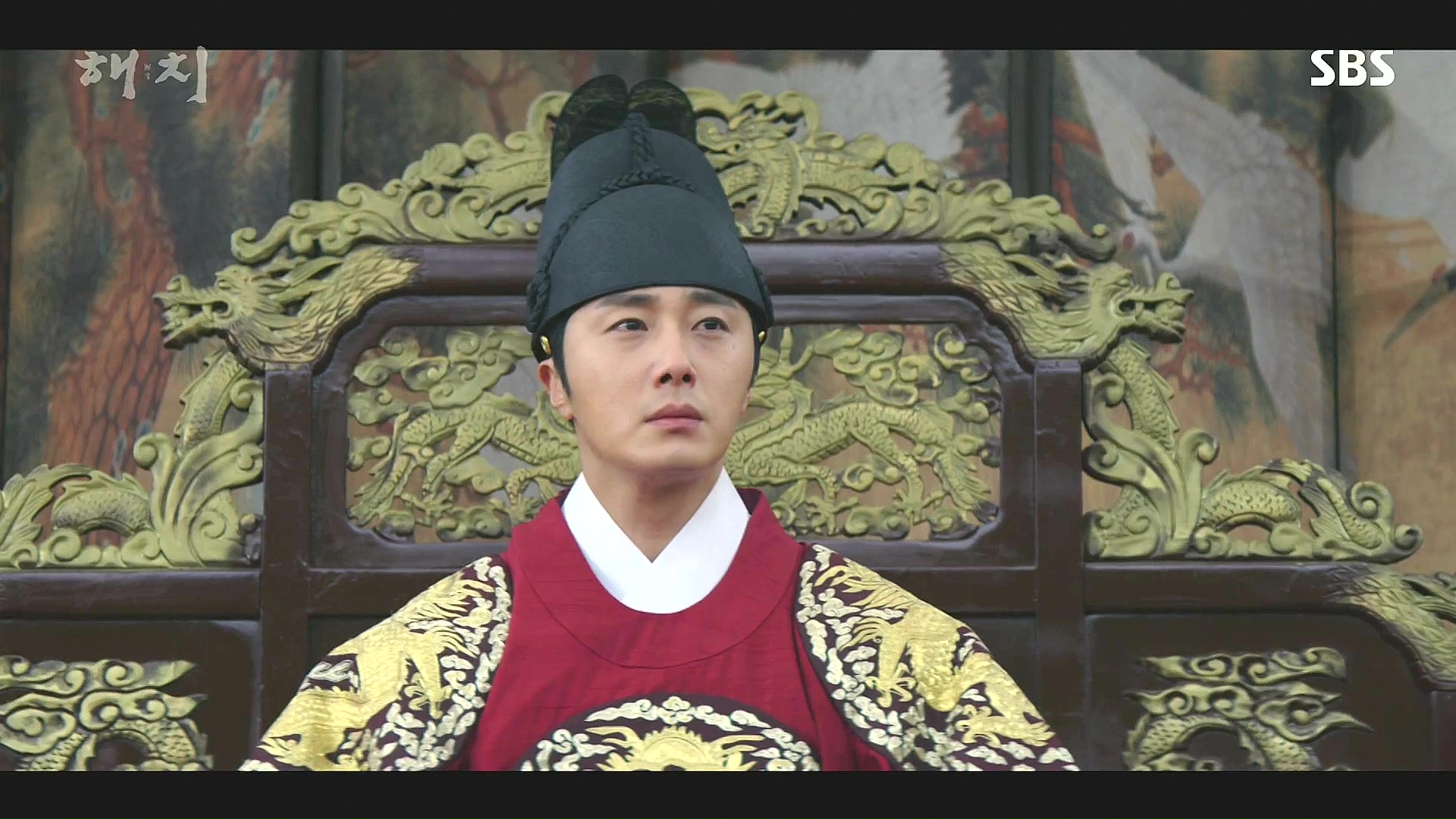
Our king has come a long way since we first met him as an insecure prince who acted up because that’s what everyone expected of him. His rise from lowly prince to respected king hasn’t been an easy one, and he’s only getting started. But he’s changed so much, and built such a strong support system, that it’s easy to see how he became one of the greatest, most influential kings in Joseon history.
EPISODES 47-48: “Haechi (The legendary beast that differentiates good and evil)”
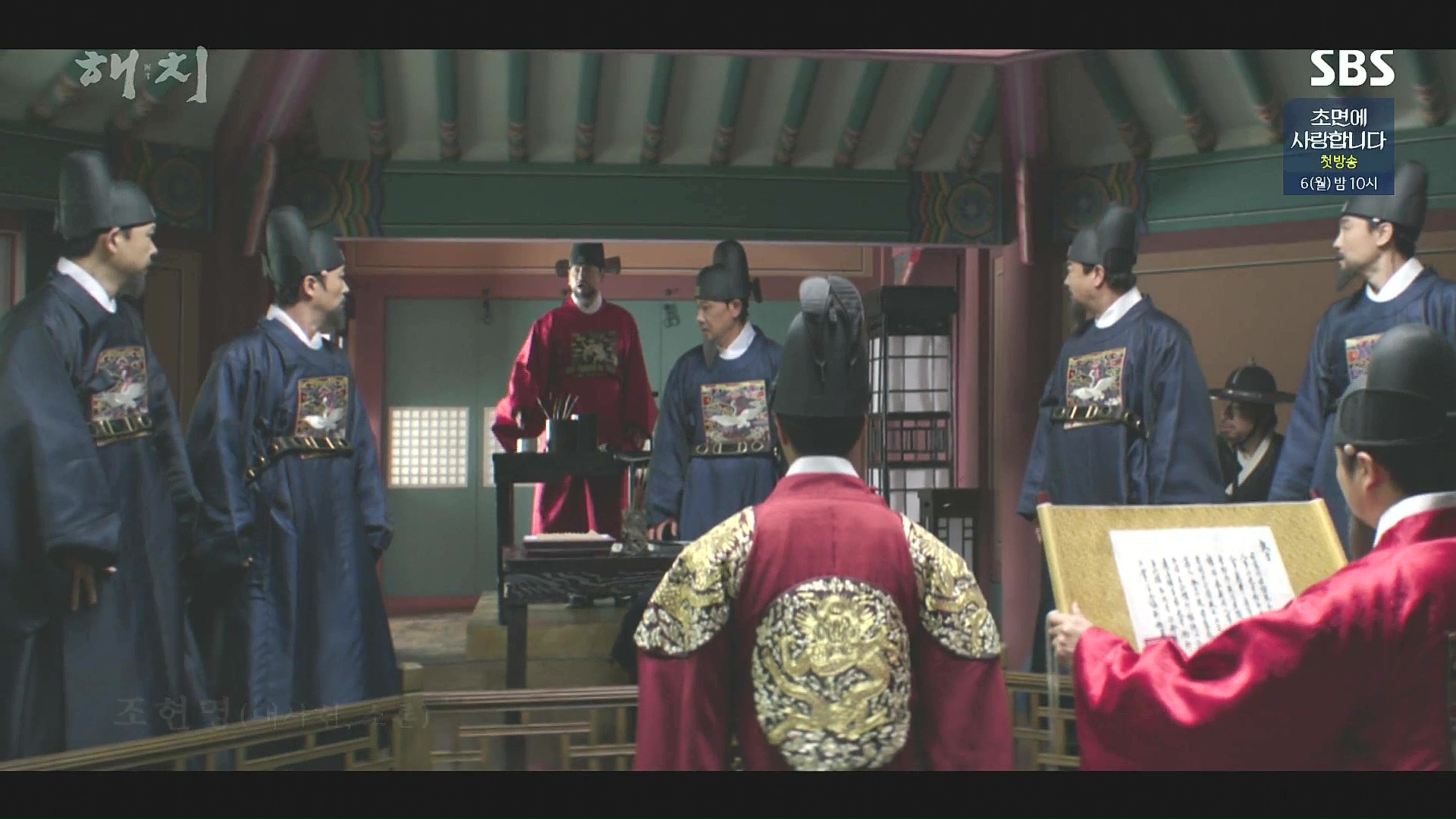
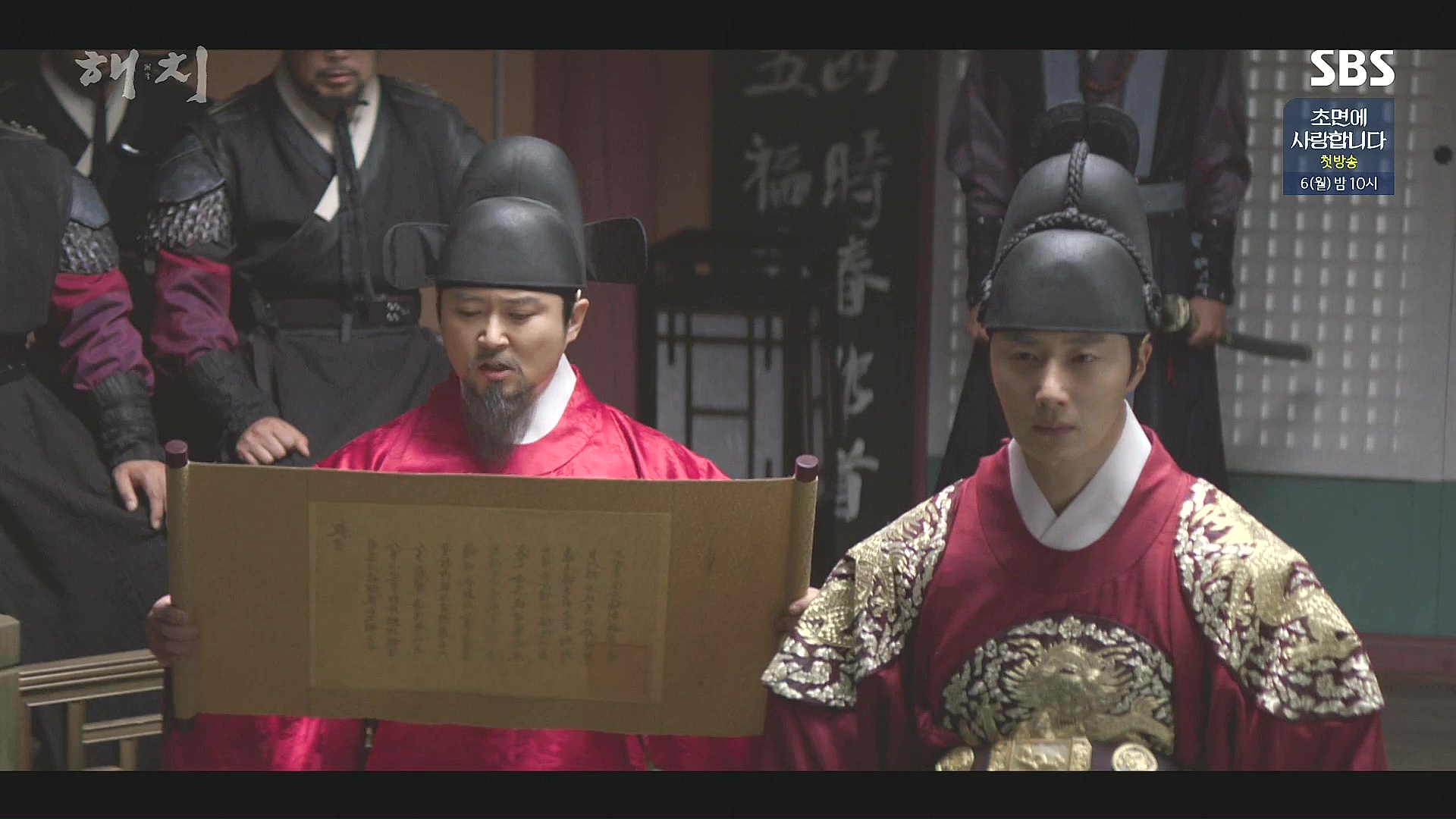
Yi Geum addresses the Saheonbu supreme court and tells them that this is where his plan for a new era in Joseon begins. He says that the Saheonbu has been corrupt for a long time, and nobody trusts it to be fair anymore, so he’s abolishing the position of section chief of personnel (which controls all three government agencies).
As Minister Lee to reads his prepared announcement, the Saheonbu officials start screaming that this is wrong and oppressive, but Minister Jo jumps to his feet and orders them to speak to the king with respect. Minister Lee continues like nothing is happening, and Yi Geum never reacts to the chaos around him. Soon everyone in the room is arguing at top volume, but Moon-soo watches as Yi Geum calmly lets it wash over him.
After things die down, Yi Geum tells Moon-soo and Hyuk that the Saheonbu will be in an uproar for a while. But Hyuk says cheerfully that they’ve all been waiting for this, and Moon-soo adds that Yi Geum can trust them to handle things.
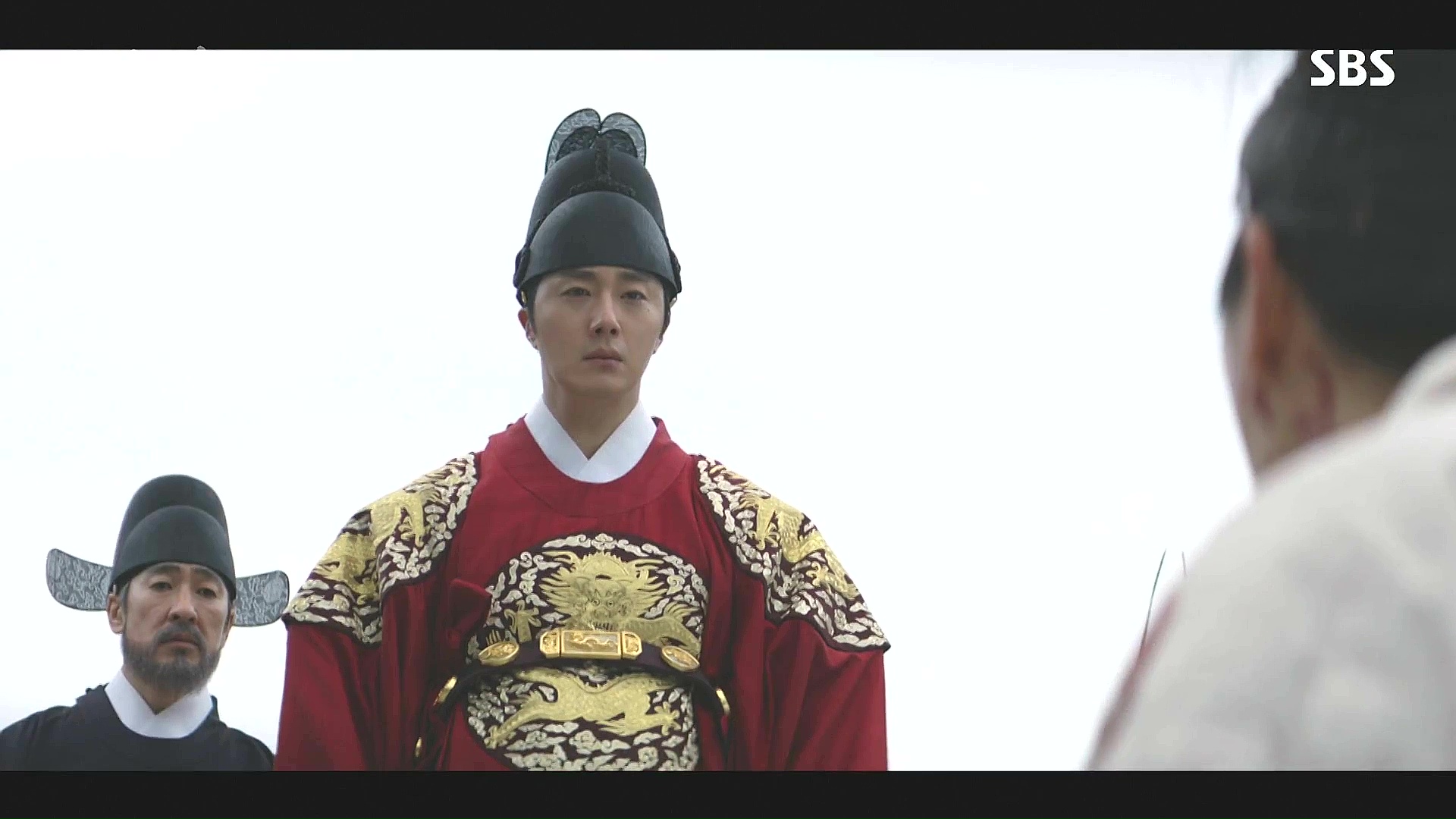
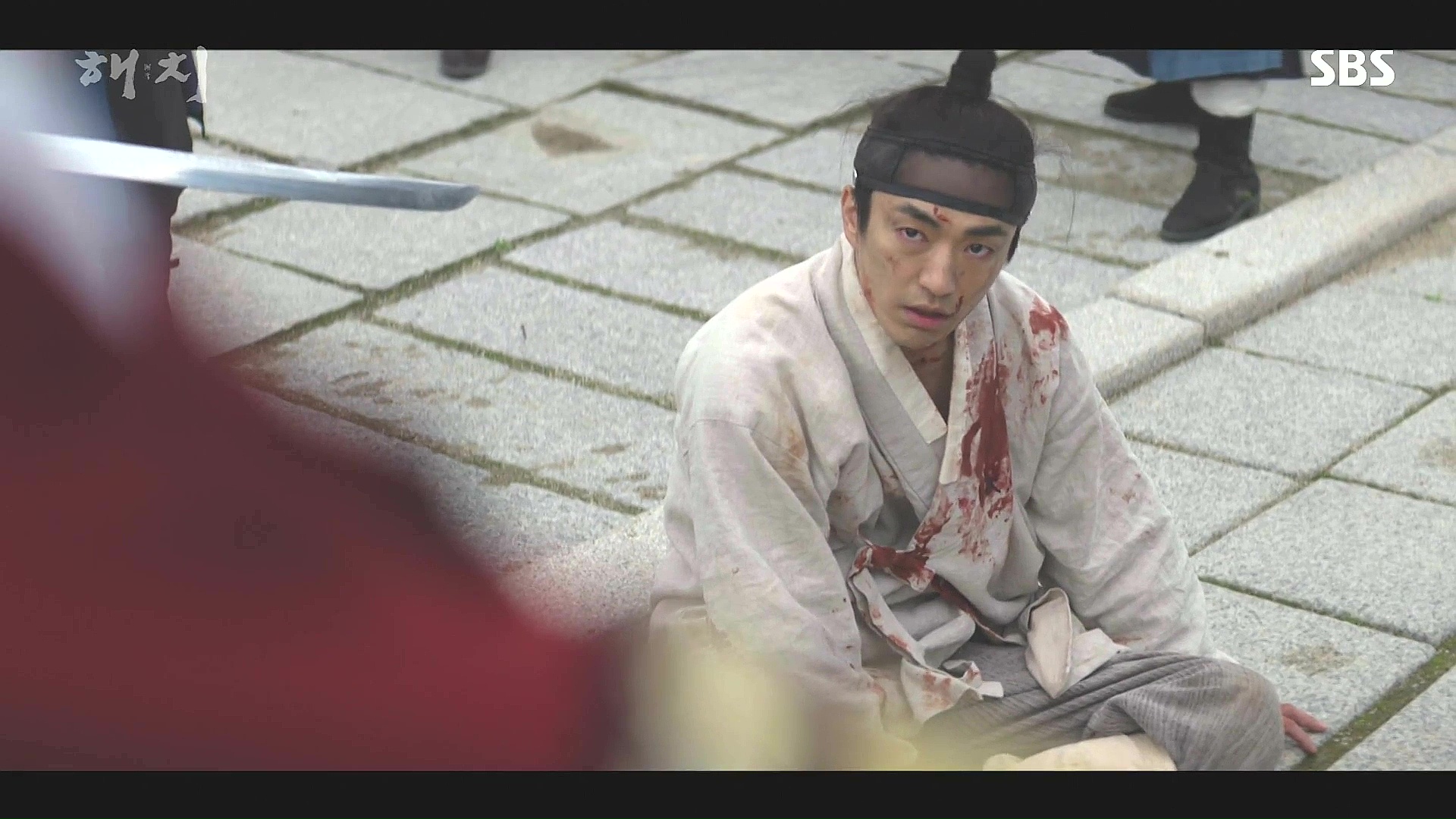
Ja-dong finds Yi Geum and tells him to return to the palace immediately — Yi Tan has gotten inside and is causing problems. He’s still covered in Yoon-young’s blood and is demanding to be recognized as the king, and he fights the guards so hard that they have to hit him several times to make him stop struggling.
Yi Geum returns to find Yi Tan on the ground after his beating. A guard warns Yi Geum that this might be a last-ditch rebellion trick and urges him to leave, but Yi Tan says that he came to talk to Yi Geum. He can’t even stand, so he just sits on the ground as he slurs that he still doesn’t understand why everyone is on Yi Geum’s side.
Yi Geum bellows at Yi Tan to tell him why he came to the palace when he could have escaped. Yi Tan snarls, “I came to die as king. I would have been caught anyway. I wanted to die like a king!”
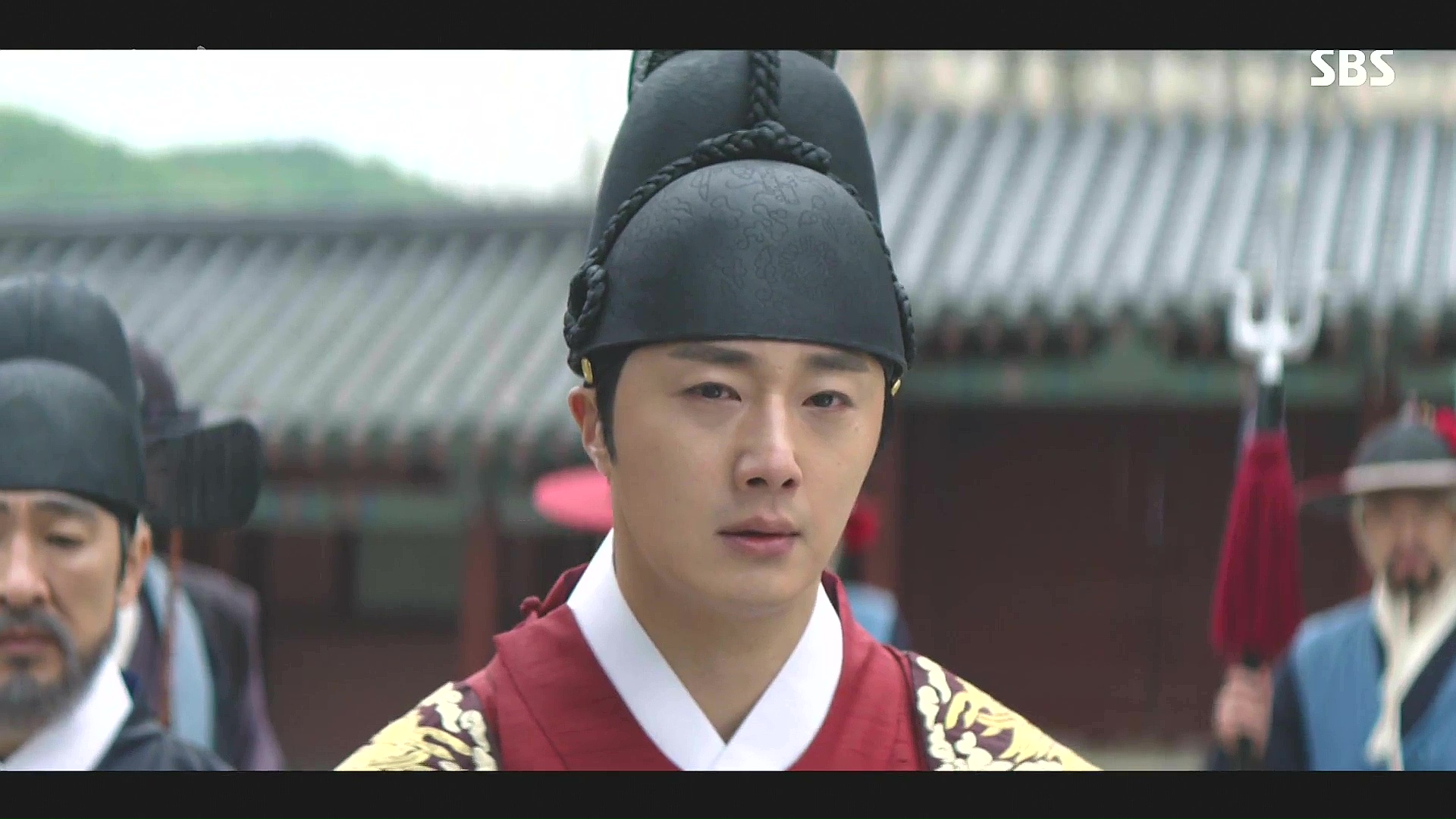
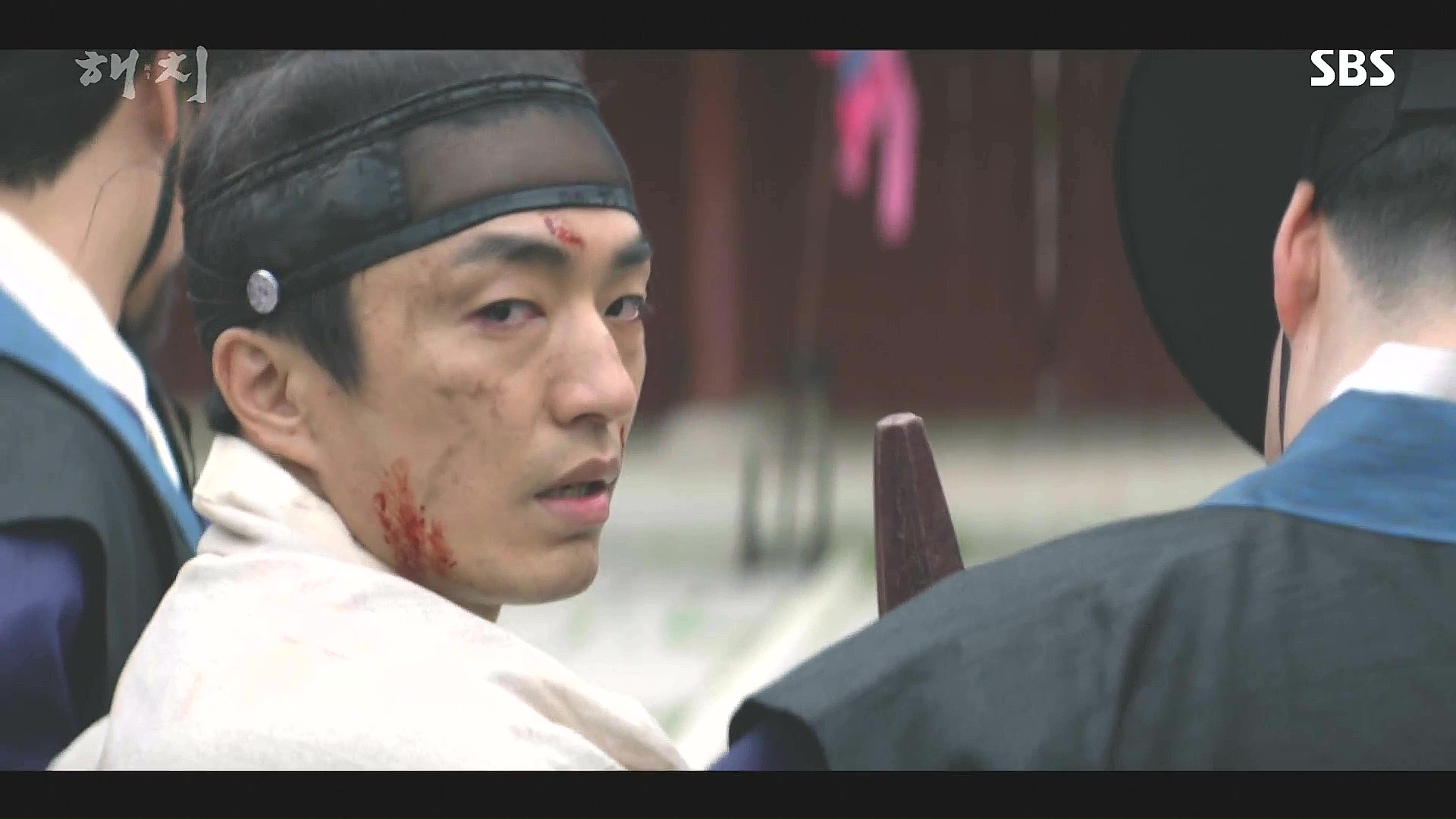
Yeo-ji tells Queen Inwon that Yi Tan broke into the palace with a weapon and asks her to stay inside. She rushes to the courtyard, but she stops when she sees that Yi Tan is on the ground and Yi Geum is okay.
Looking down at the sobbing Yi Tan, Yi Geum says that he must be very scared, yet he still came here to die proudly as a king. He tells Yi Tan that if he’d made such frightening and difficult decisions from the beginning, maybe he could have had the throne. But he says that Yi Tan committed too many evil deeds for far too long, so he will pay for his sins with his death.
He tells his guards to take Yi Tan away, and at first Yi Tan goes quietly. But then he mumbles that he won’t die like this, by Yi Geum’s hands. In one quick movement he throws off his guards, grabs one of their swords, then runs at Yi Geum screaming. Just as he reaches Yi Geum, Yeo-ji throws herself between them.
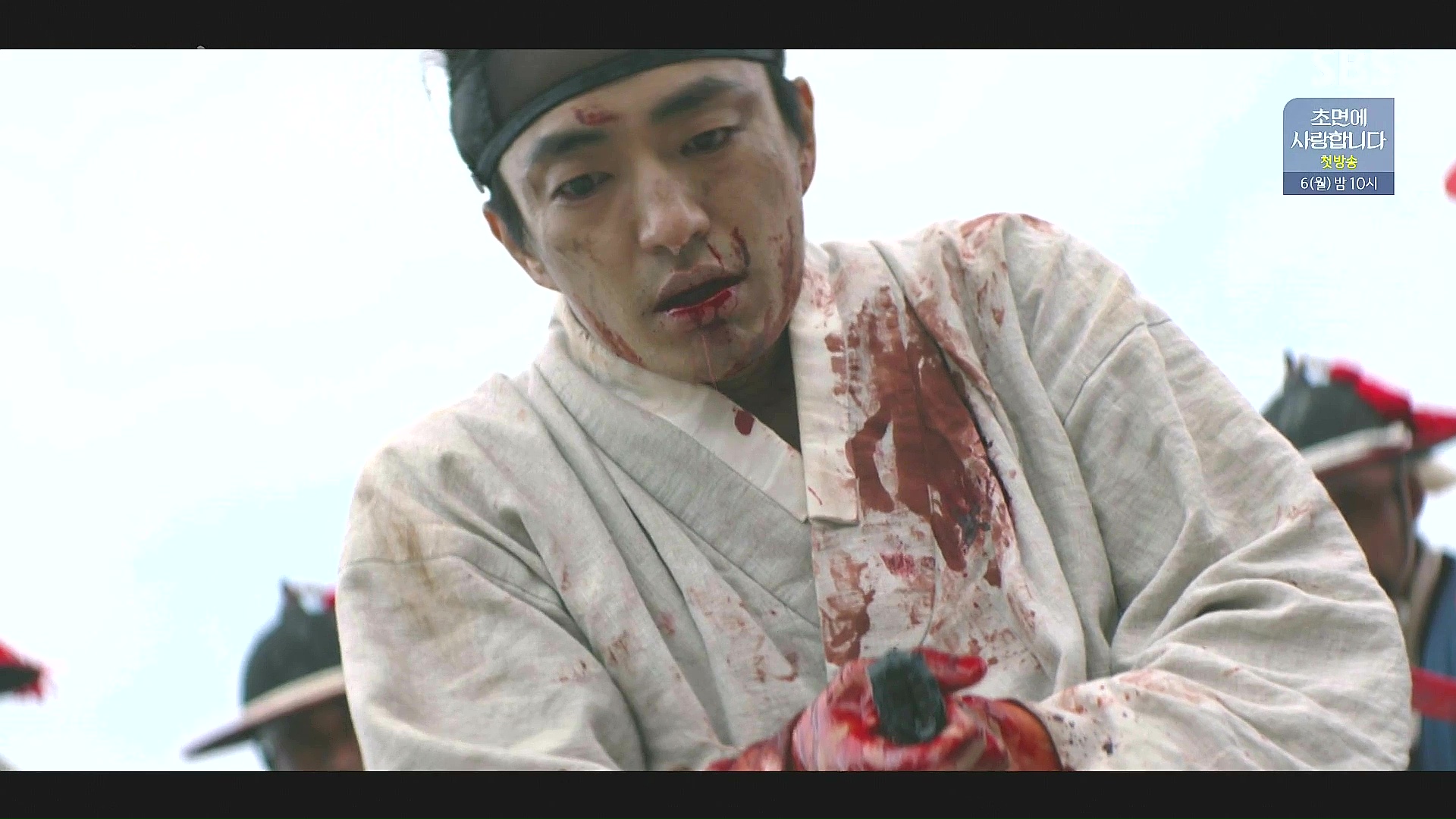
There’s a flurry of movement where everything happens at once, then they all stop, frozen. Yi Geum has grabbed Yeo-ji and spun them both around, and Yi Tan is on his knees. Yi Geum slowly turns and sees that instead of striking at him, Yi Tan has run the sword through his own body.
He gasps, “Okay, you win, Yi Geum. I lost.” He thinks about Yoon-young telling him that she’ll wait for him on the other side and to come to her as a king, and he says, “My last moment as king… ” then he dies.
Minister Min is shaken by the news of Yi Tan’s suicide. He tells Chief Justice Jo that he built Yi Tan up as the Norons’ candidate for king because they wanted someone malleable who would follow orders. He admits that it was a mistake, and that he feels a lot of regret now. Chief Justice Jo says that a life without regret would be even more terrible, and Minister Min sighs heavily.
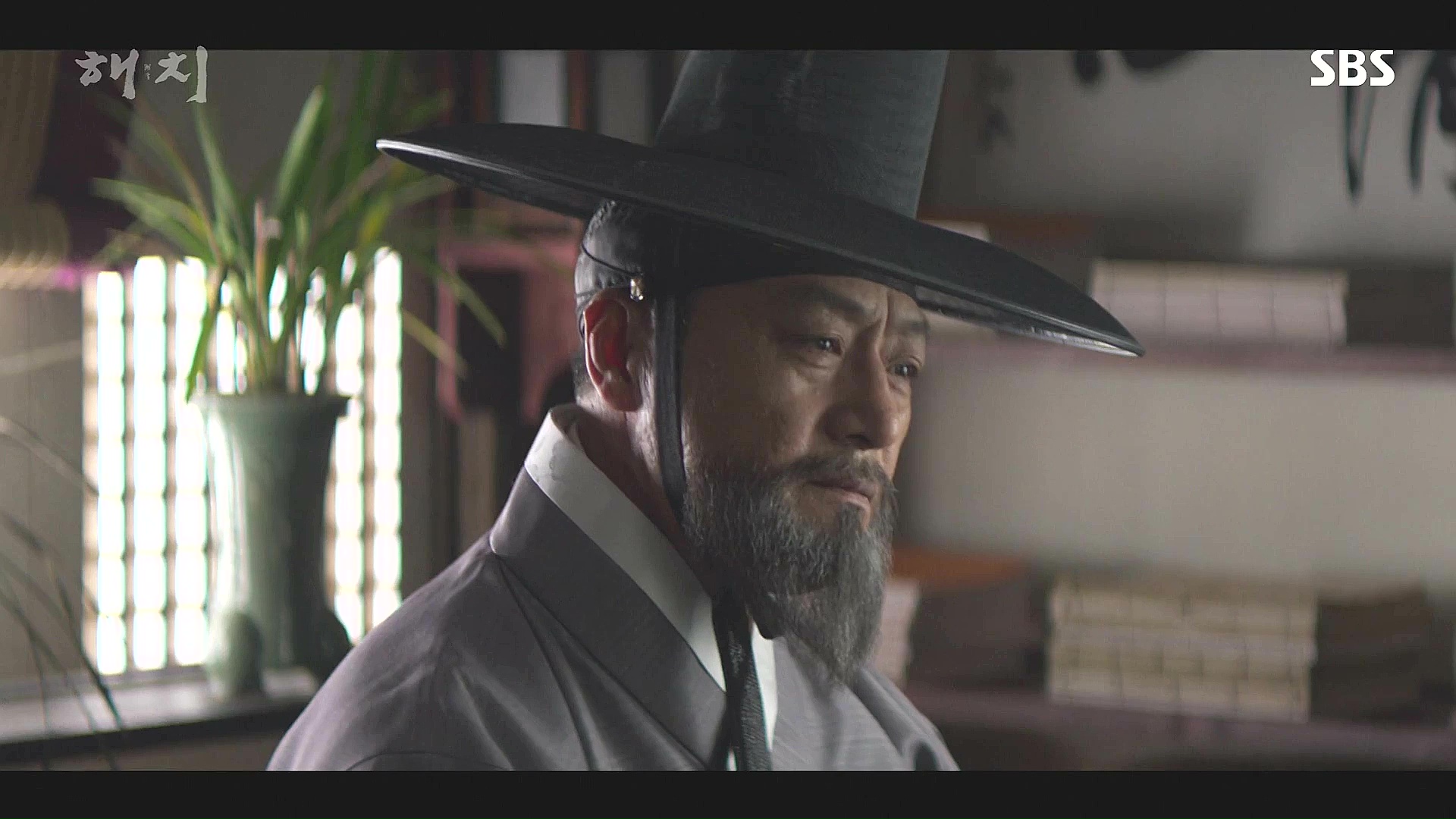
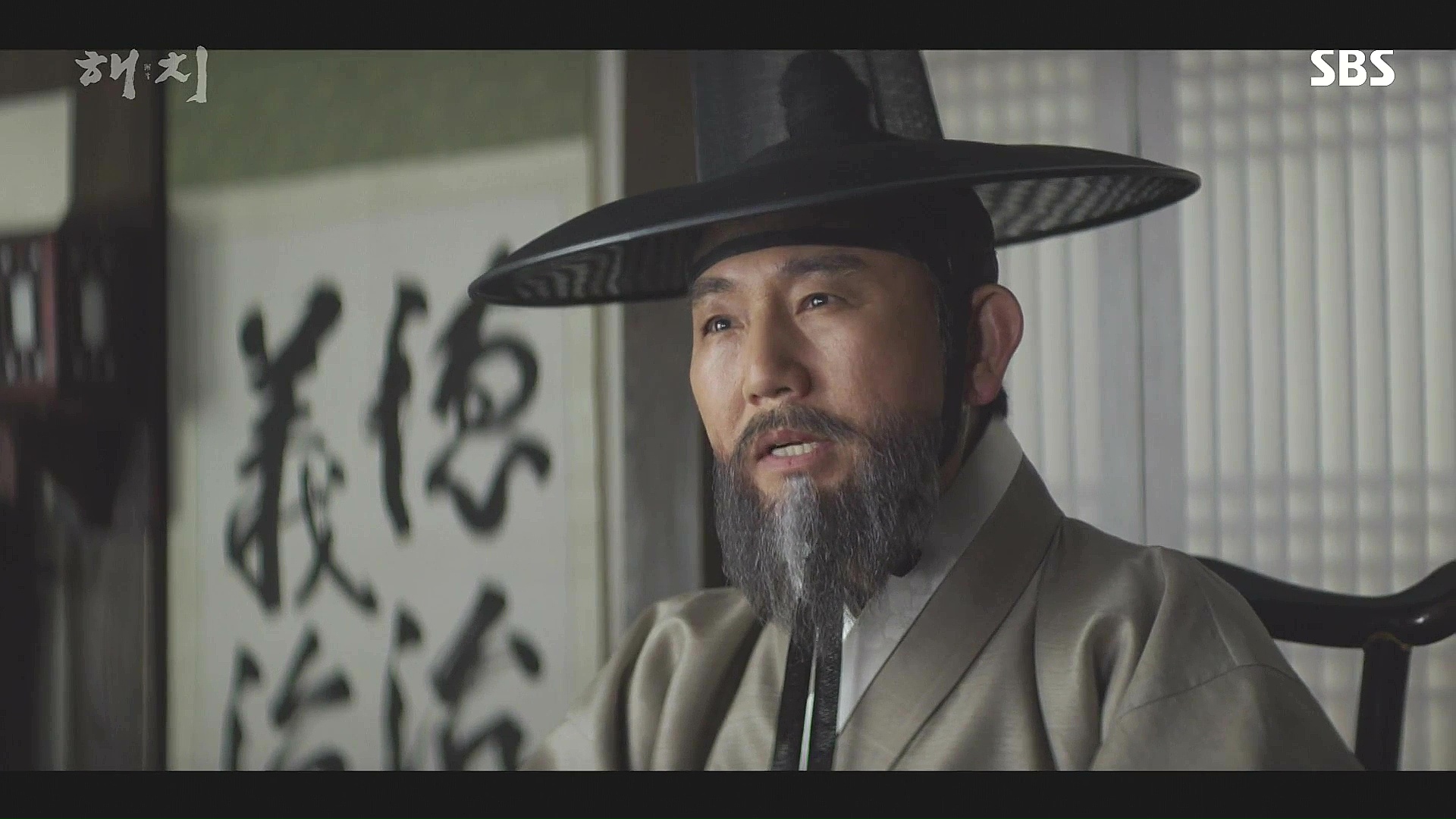
Back at the Saheonbu office, the inspectors talk about Yi Tan’s death. Moon-soo tells them not to gossip about someone who’s dead, and he’s asked if Lee In-jwa and Byung-joo will be executed as well.
Minister Lee also urges Yi Geum to make a decision regarding the two rebels, and Yi Geum looks deeply troubled, but he’s confident when he addresses the court to pass down their sentences. In-jwa, as the instigator of the rebellion and ultimately responsible for all the lost lives, and Byung-joo for Jung-seok’s death and for joining the rebellion, are both to be beheaded.
A crowd gathers when it’s time for their sentences to be carried out. They’re taken outside the palace gates and made to kneel, and as they wait, Byung-joo murmurs to In-jwa that this is all his fault. In-jwa tells him that he fought for a great cause, so he should face death proudly, but Byung-joo retorts that there’s no such thing as pride before death.
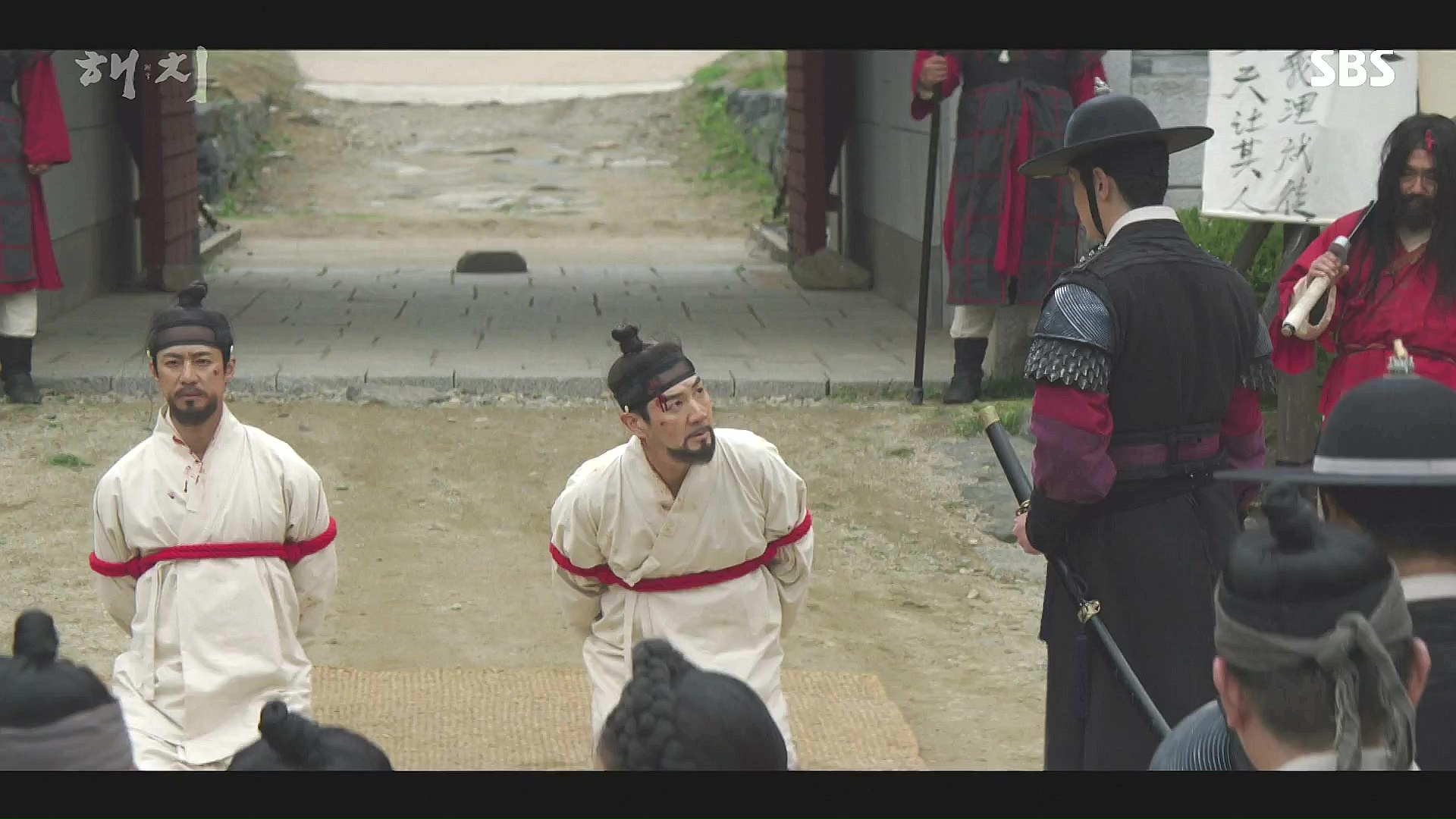
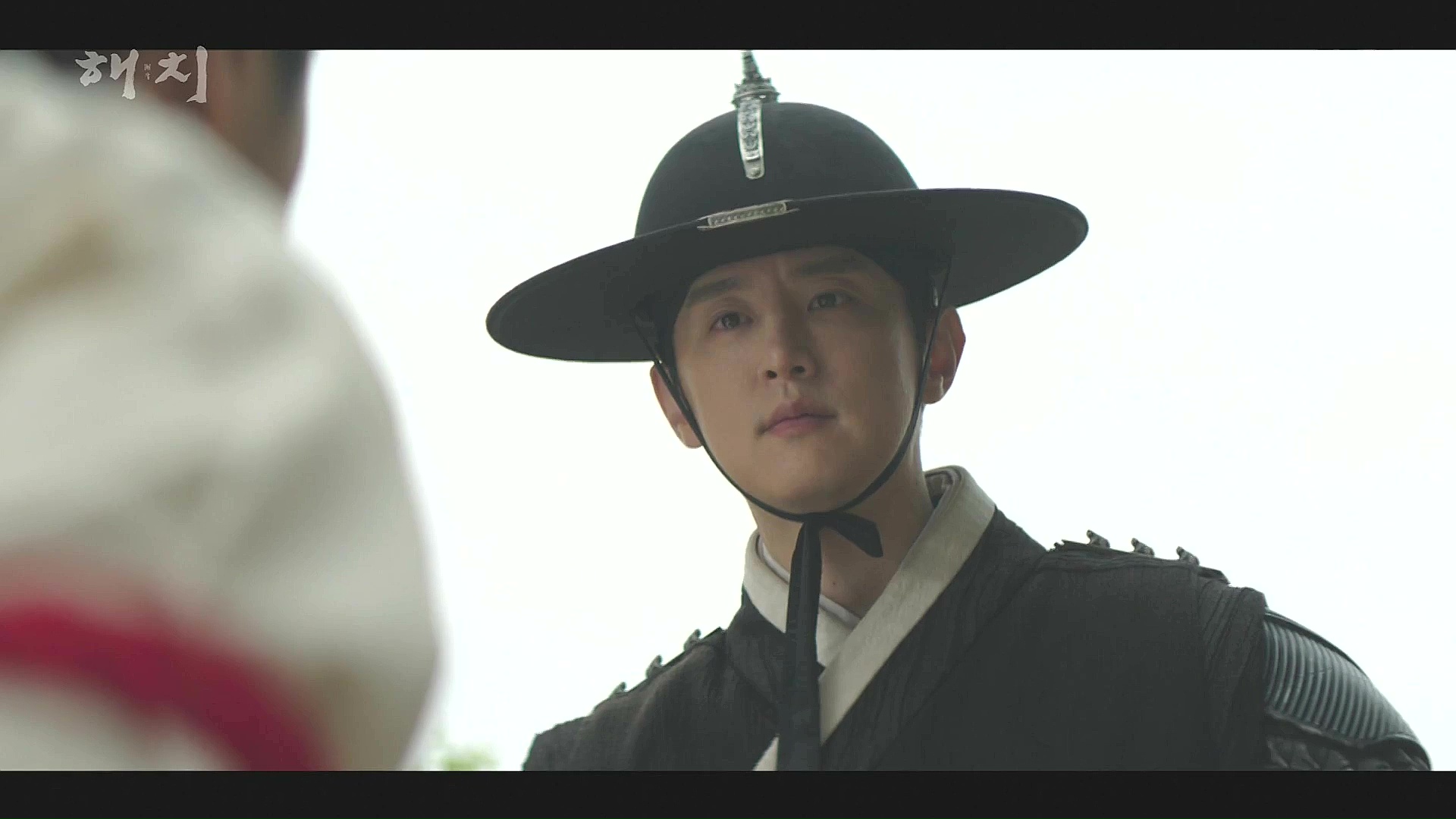
Moon-soo is nearby, and he tells Byung-joo that if he’d chosen to be a human and had helped Jung-seok when he asked, then he would be one of the Namins being appointed to government positions right now. Byung-joo admits that Moon-soo is right, but he says that someday Moon-soo will be kneeling where he is. Moon-soo says it’s possible, but at least he won’t be shaking in fear like Byung-joo.
As the executioner begins his dance, Byung-joo thinks of the time he told Jung-seok to just side with the Norons and live. Jung-seok had told him that the world they saw was very different. Byung-joo dies with regret in his heart.
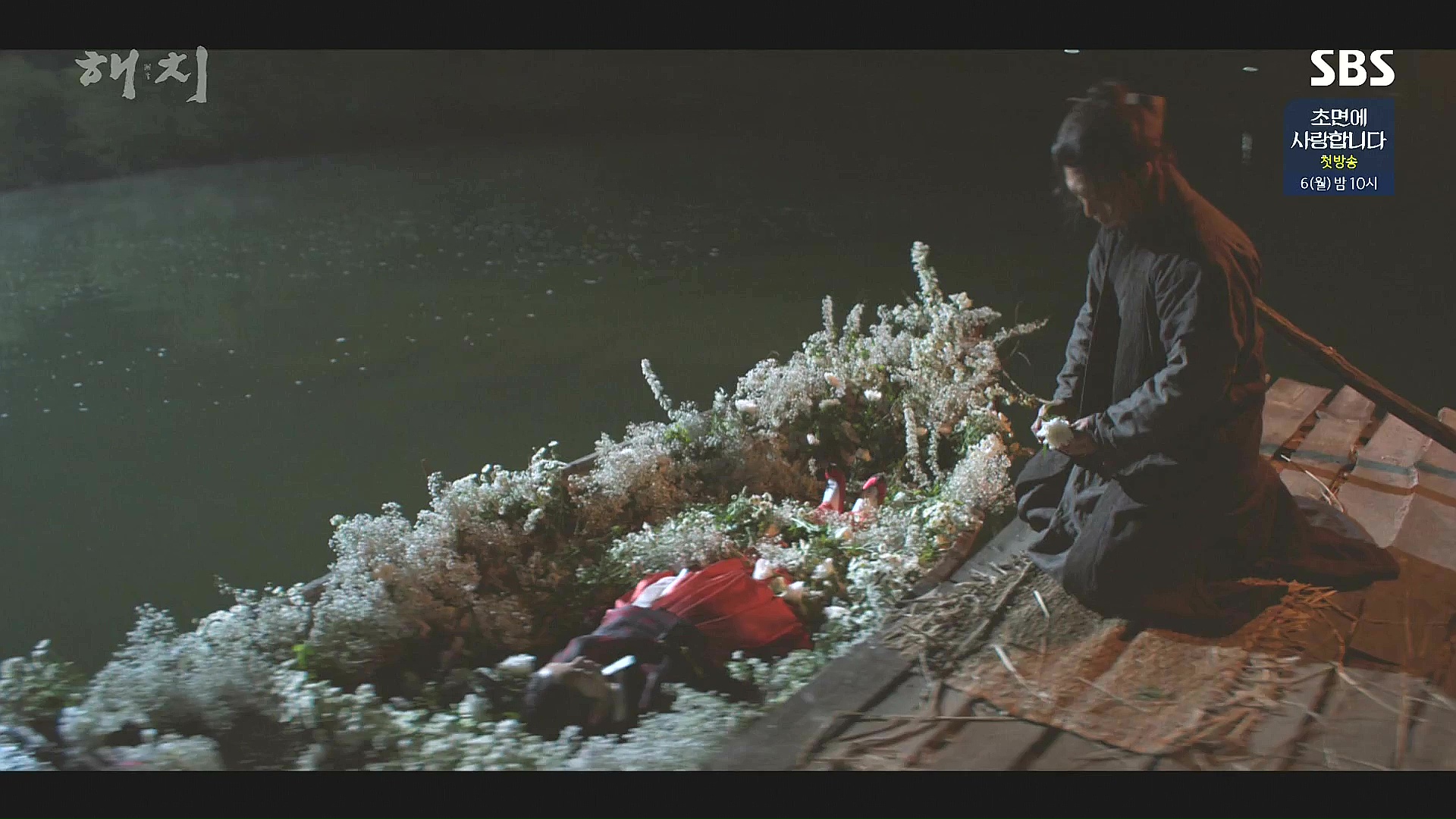
The morning after Dal-moon found Yoon-young’s body, he’d hunted down the man who tried to help her and Yi Tan escape and killed him. He places her body in a boat on the water, surrounded by flowers, and he says goodbye to Bok-dan, the woman he loved: “In the next life, have no regret or resentment. As you wished, be born again as Yoon-young, wearing silk clothes. You tried hard enough.”
Yeo-ji visits Yi Geum, thinking that he could use some company after a difficult day. Yi Geum says that he’s scared, because as long as he’s king, he’ll continue to have to punish and kill people. He wonders if he’ll always make the right decisions, and Yeo-ji says that the very fact that he’s asking himself these questions proves that he’s qualified to be king.
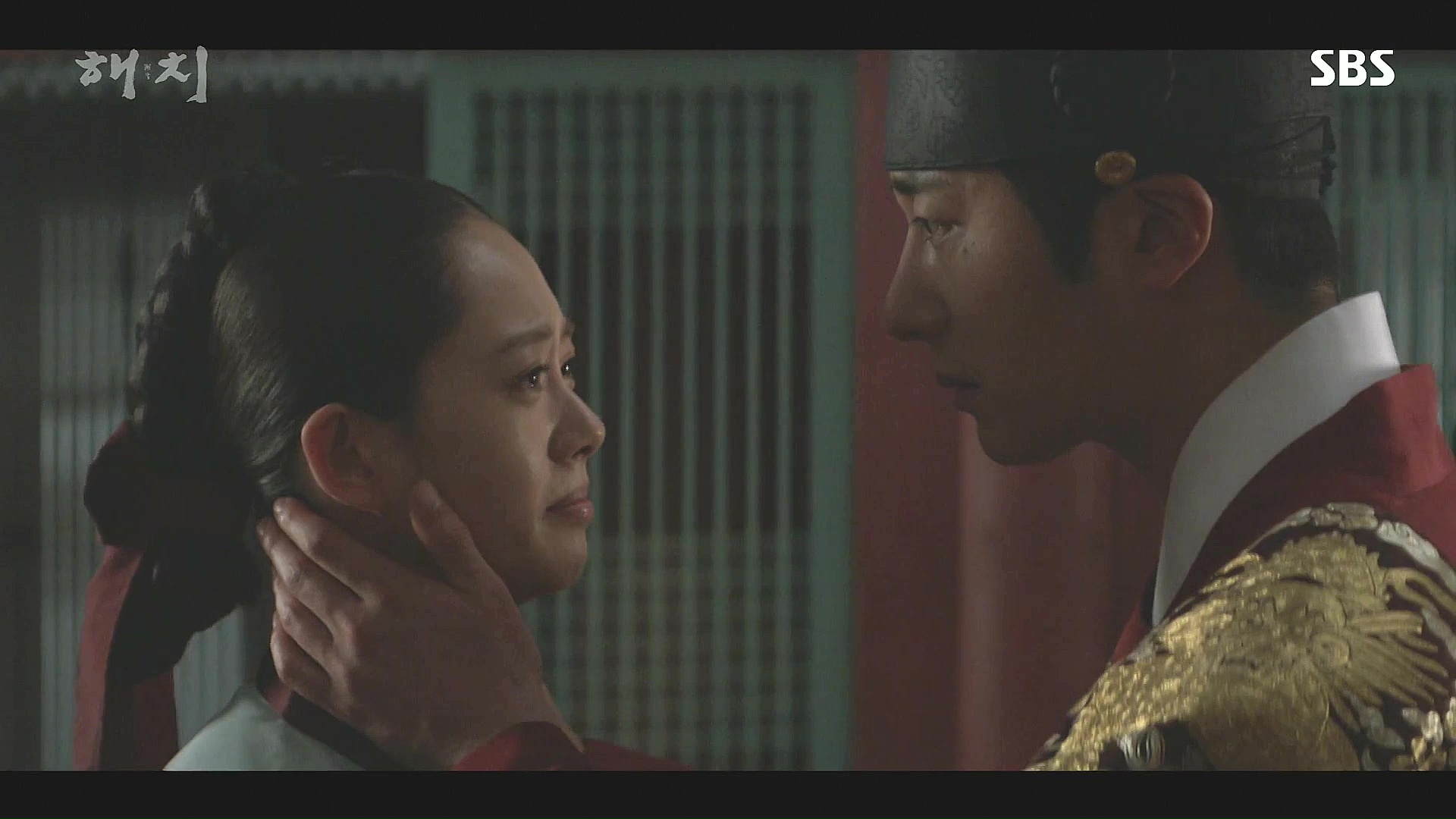
She continues that he may make bad decisions, but he’ll keep asking himself the same questions and will return to the right path. She says that’s why she trusts and respects him, and why she loves him. Yi Geum gratefully folds Yeo-ji in his arms, then wipes away her tears.
The Saheonbu is in chaos just as Yi Geum predicted, and the Norons complain to Minister Min. Minister Min says that Yi Geum suppressed the revolt and is loved by the people, so there’s no reason for them to fight it.
Minister Lee and Minister Jo are worried about Yi Geum, who hasn’t been sleeping much lately. But he tells them not to worry, comparing himself to a wolf tirelessly hunting prey, and heads in to today’s meeting.
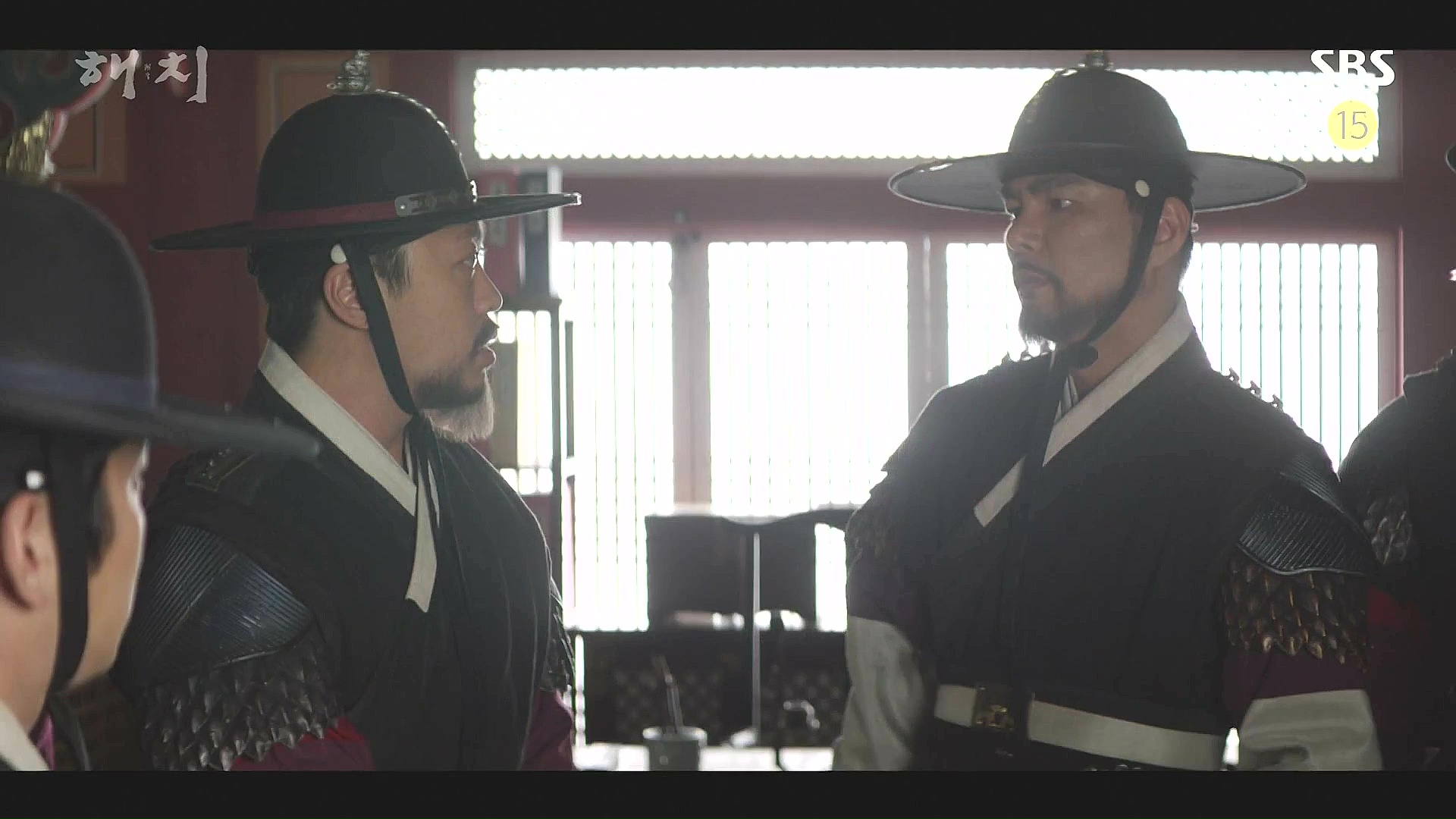
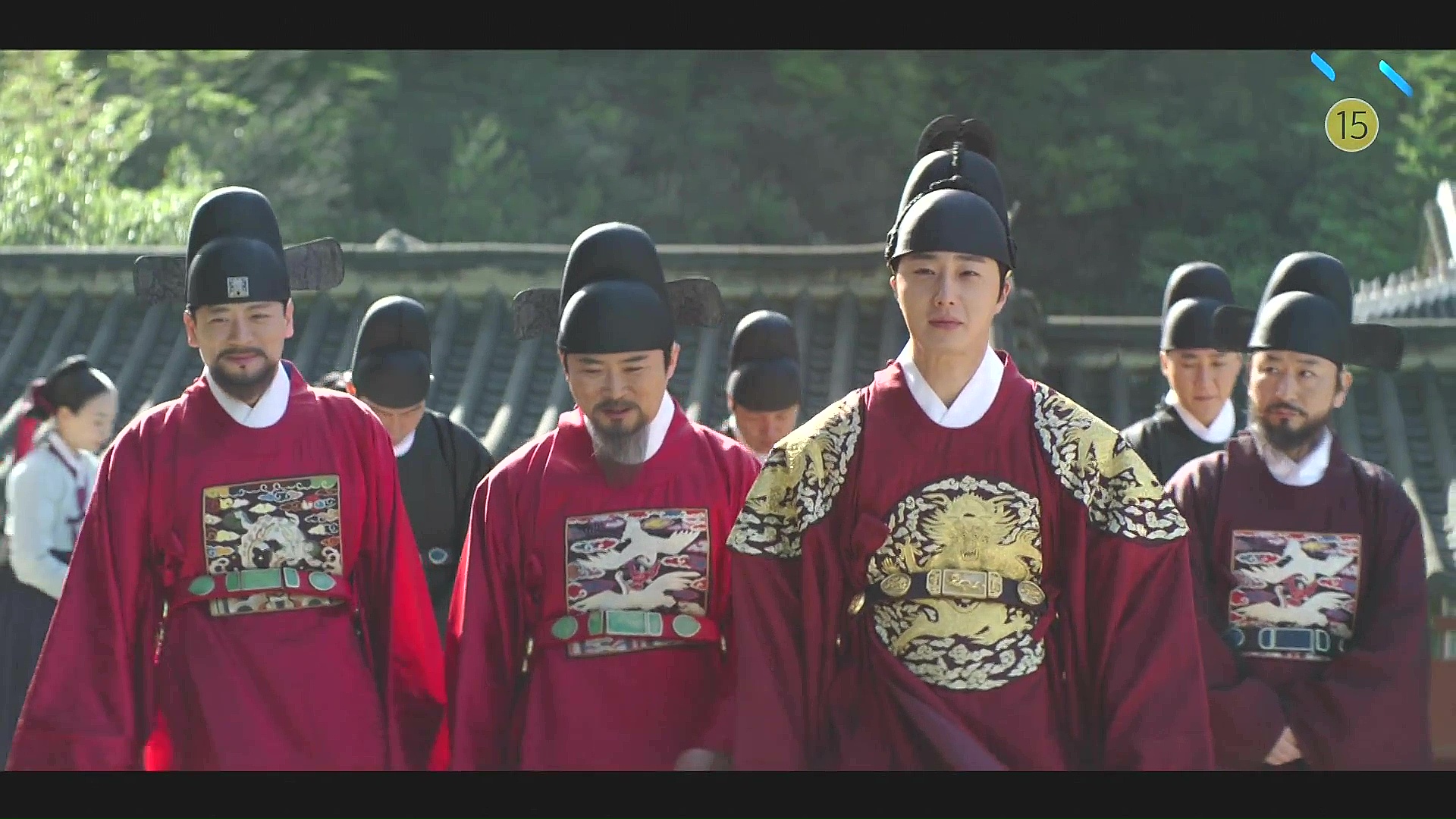
Hyuk and the Saheonbu inspectors sign a petition supporting the changes Yi Geum is making, and even Young-han says that he signed it because he’s been hoping for a change for a long time. Ah-bong notices that his name isn’t on the petition, but there is a Young-hoon, so they make him write it correctly.
The ministers are arguing against Yi Geum’s abolishing the chief of personnel position, saying that it’s there to stop the tyranny of high-ranking officials. Yi Geum says that was the goal originally, but it became corrupt and degraded. He’s asked how he plans to ensure that the reformation will be free of corruption, and Yi Geum says he already detailed his plan and asks if they actually read everything thoroughly.
Ha, it’s obvious that they didn’t. Yi Geum tells them to take a break and they’ll resume the meeting in half an hour, obviously trying not to laugh at them. The ministers are all sore from standing for hours during all of Yi Geum’s meetings, and Yi Geum jokes to Minister Lee and Minister Jo that it’s good to be the king, because he gets to sit on the throne the whole time.
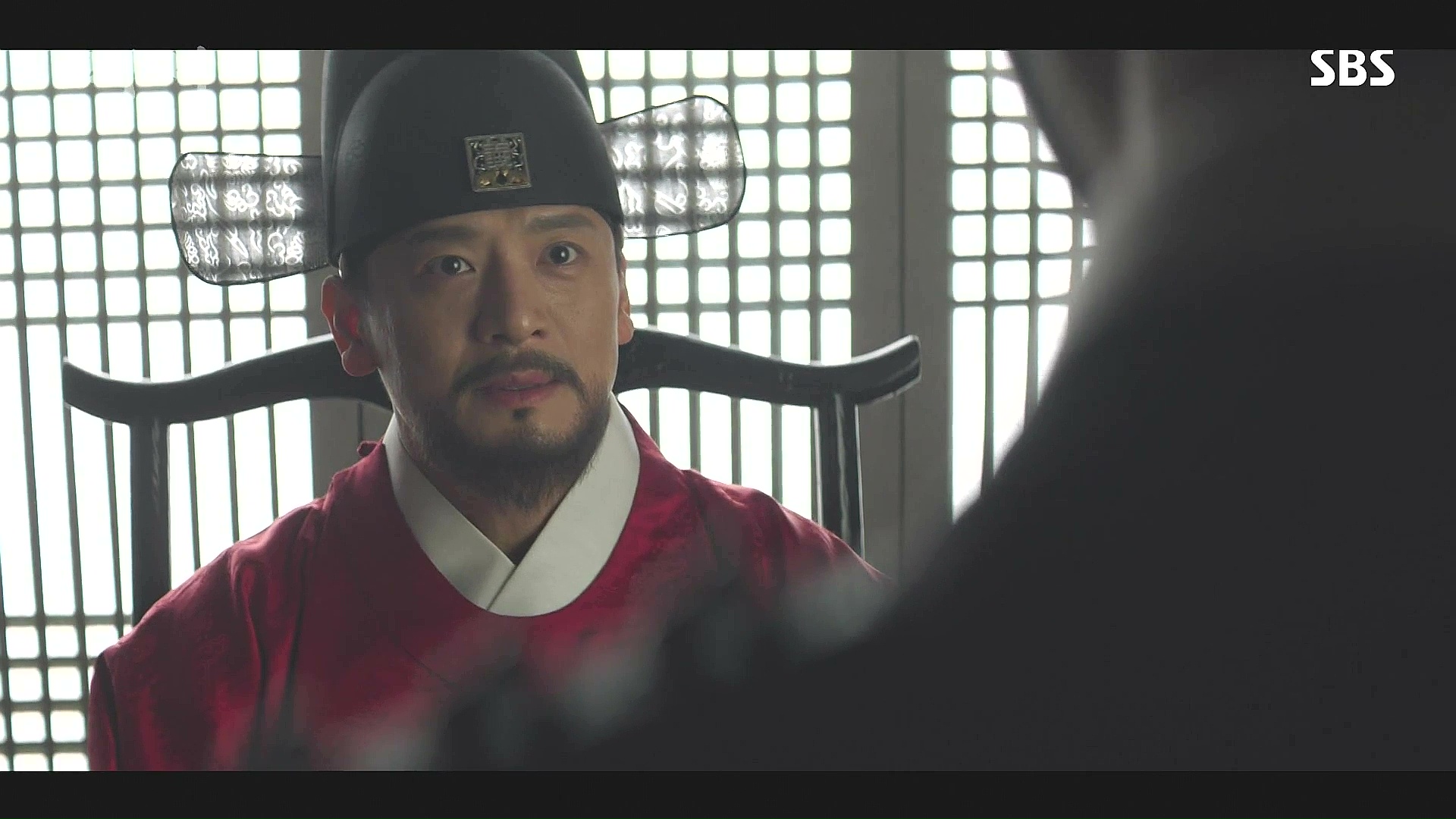
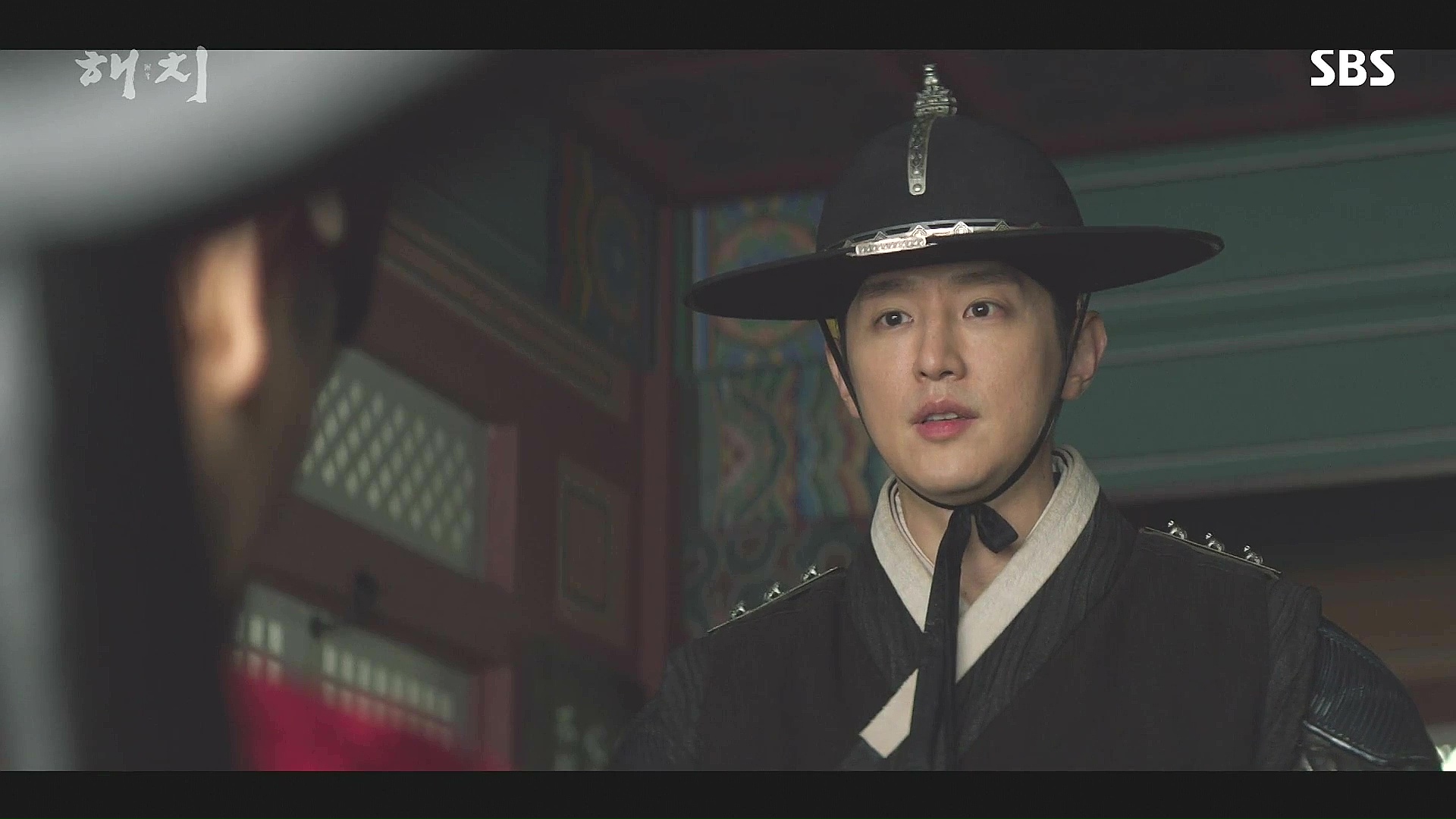
He’s trying to exhaust the ministers and make them back down, and it’s starting to work. They argue among themselves in between the endless meetings, accusing each other of not fighting back hard enough.
Moon-soo takes the Saheonbu petition to Minister Jo, who says that Yi Geum needs something like this right now. Meanwhile, Yi Geum decides to leave the palace and ask the people what they think about his reformation plan. He says that former rulers thought of the people as something to be ruled, but they’re people who work and pay taxes.
Minister Lee argues that it’s not easy for a king to go among the people, but Yi Geum says that he’s spent more time out there with the people than he has in the palace. He adds that half of his blood comes from those people, so he’s more suited to do this than any other king has been.
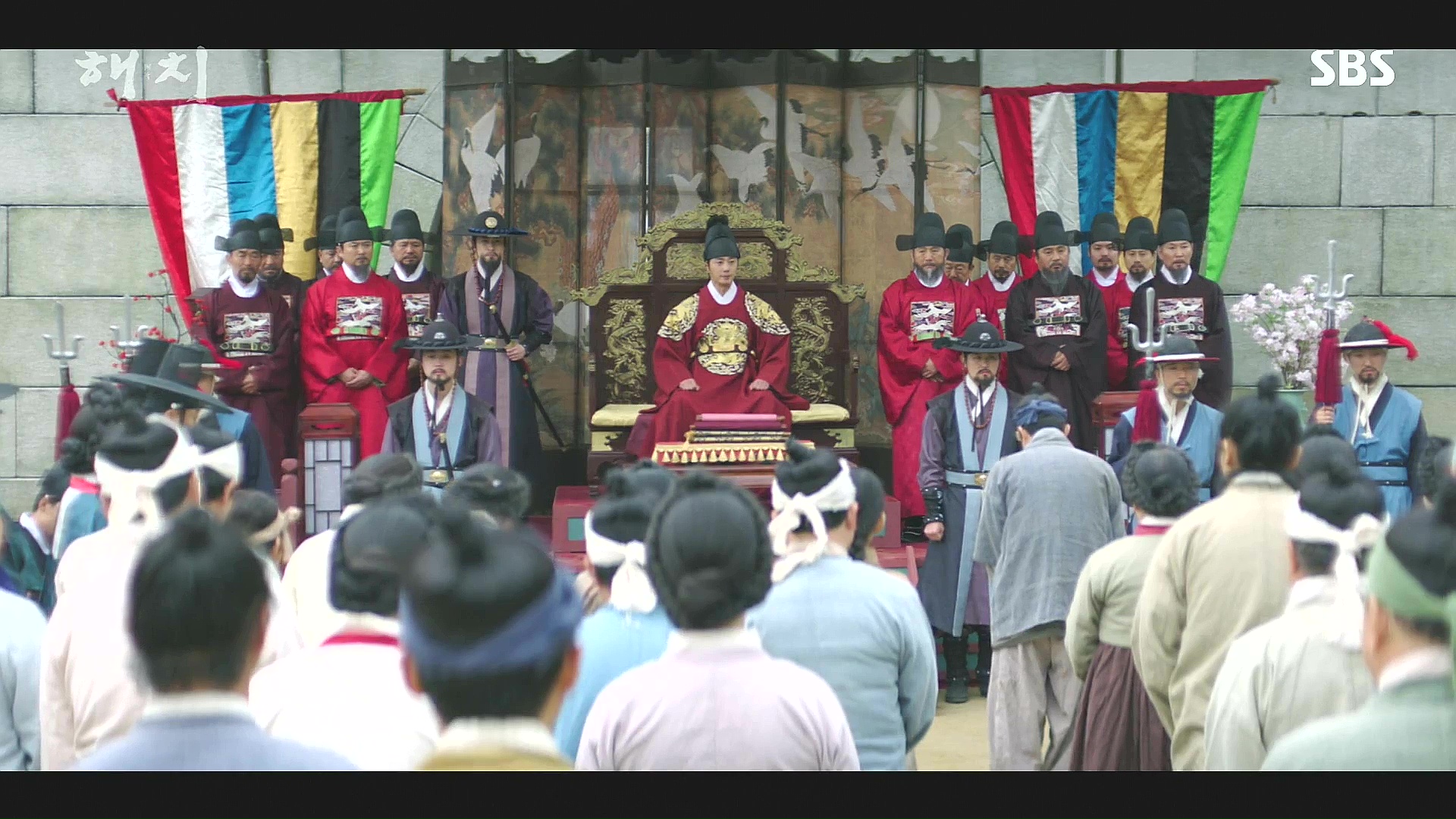
The people love the idea when they learn that Yi Geum wants to talk to them directly. Dal-moon looks proud when he hears, and Storyteller laments, “I’ll lose my job!” The Soron ministers complain that they don’t want to have to listen to the people’s opinions on taxes, but Chief Justice Jo points out that the people are the ones who pay the taxes.
The people feel the same way — they tell Yi Geum that they work hard to pay those taxes, so they know more about it than anyone. Yi Geum tells them that social status doesn’t matter, and asks them to tell him all of their grievances openly.
The talks go on for a lot longer than expected, and when Queen Inwon hears, she has the royal kitchens prepare food. Yeo-ji pitches in to help, and Queen Inwon says that she spends so much time doing things to help the king that it’s time she was transferred to the king’s palace, pretending to have hurt feelings about it. Yeo-ji thinks she’s serious, but Queen Inwon just laughs and says that she’s always planned on sending Yeo-ji to be with Yi Geum.
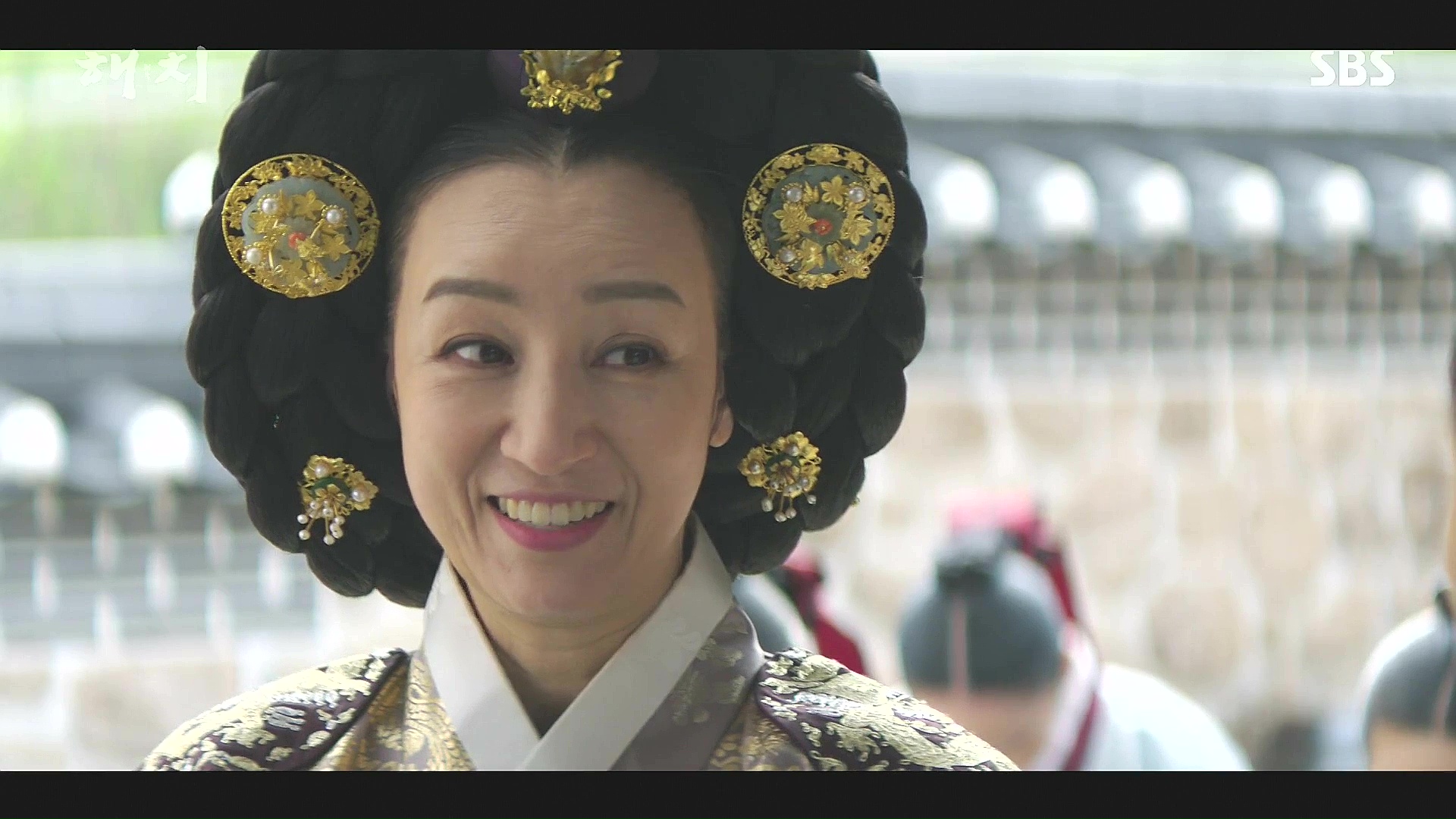
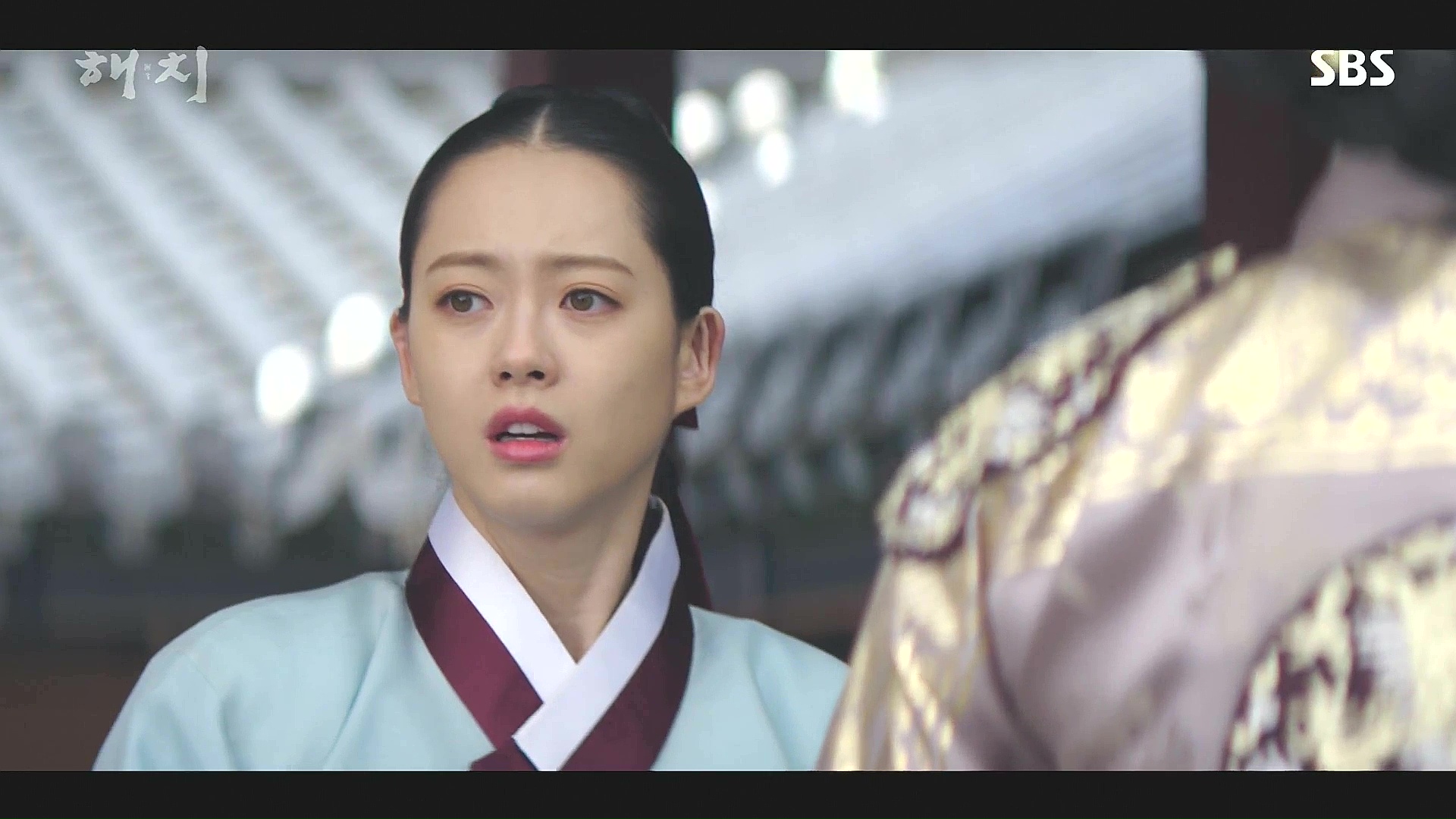
It’s getting dark and the ministers are all whining about how long they’ve been doing this by the time the women arrive with the food. Yeo-ji watches Yi Geum proudly as he decides to tax the landowners according to what they own, to take the pressure off the peasants.
It’s the last straw for the nobles, who feel that he’s using the people’s support to unfairly make them pay taxes. Yi Geum asks what’s wrong with that, since there would be no kingdom without the people. He asks the people to split up and go to a different palace gate depending on their opinion, and says that he will follow whichever opinion has the majority.
The people have the majority vote, and the new taxation system is enacted. Moon-soo investigates rumors of nobles who cheat on paying their rice tax, and LOL, he’s got Jang-dal, Ah-bong, and even Storyteller dressed up as beggars and spying for clues. He learns of an Officer Choi, who’s been stealing the rice that’s supposed to go to the capital.
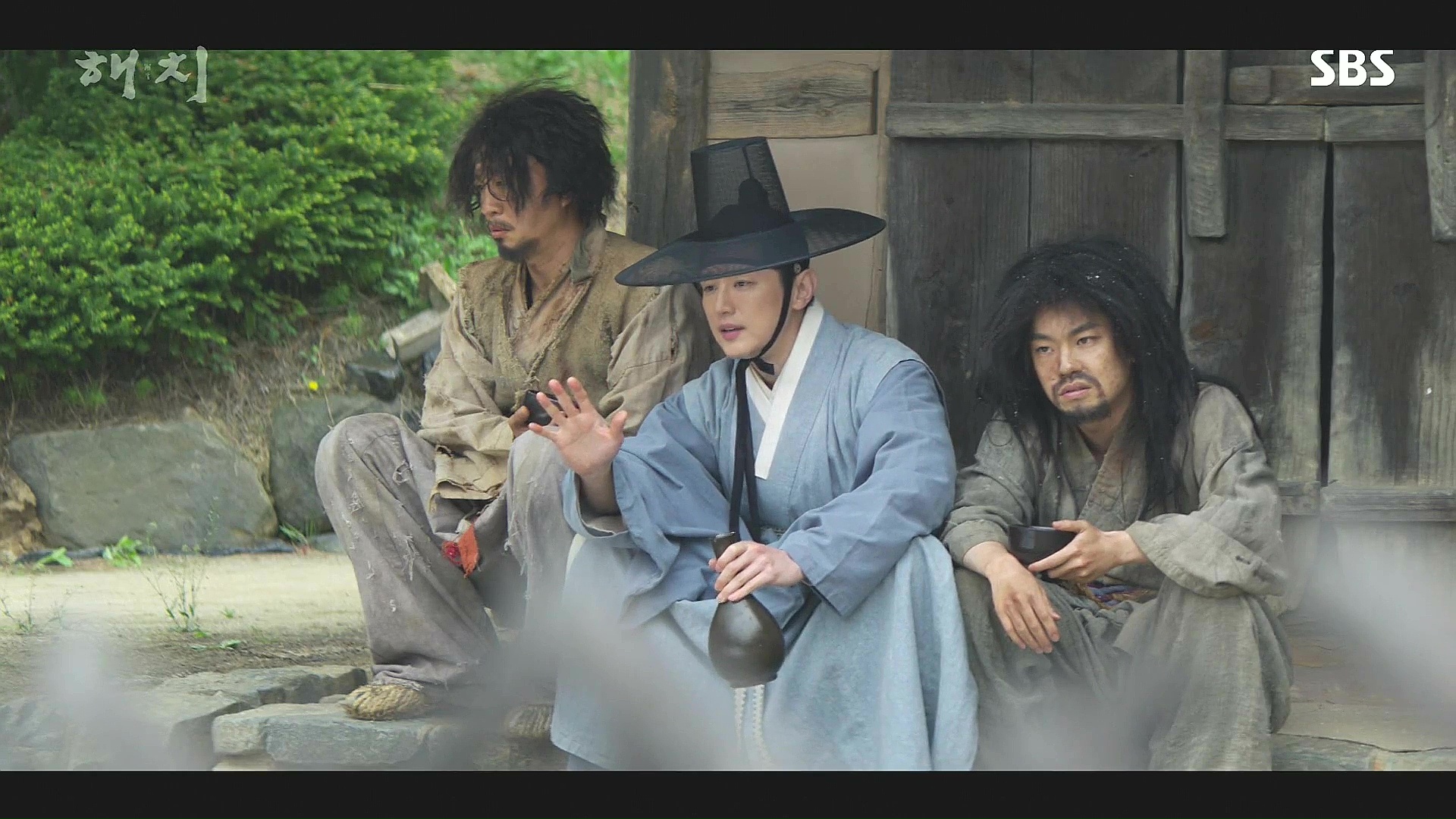
Jang-dal and Ah-bong are pretty salty about being made to act like beggars — literally, since the locals keep throwing salt on them to make them go away. They want to know why Moon-soo gets to dress like a noble, and he says that it’s because his face is too perfect, ha.
Yi Geum meets with Dal-moon at his hideout, and they mention the fact that Yi Geum is going to hold another public conversation soon, which have become a regular occurrence. Yi Geum jokes that Dal-moon is worried he’ll take over his streets, and Dal-moon jokes back that Yi Geum is the king of the palace but he’s the king of the streets.
Minister Min has retired from politics and spends his time making pottery, which has always been his hobby. He’s startled when Yi Geum shows up unannounced, saying that he had to have Dal-moon spy on him to find out where he is. He asks why Minister Min keeps ignoring his summons to the palace, and Minister Min says it’s because he’s finished his duties.
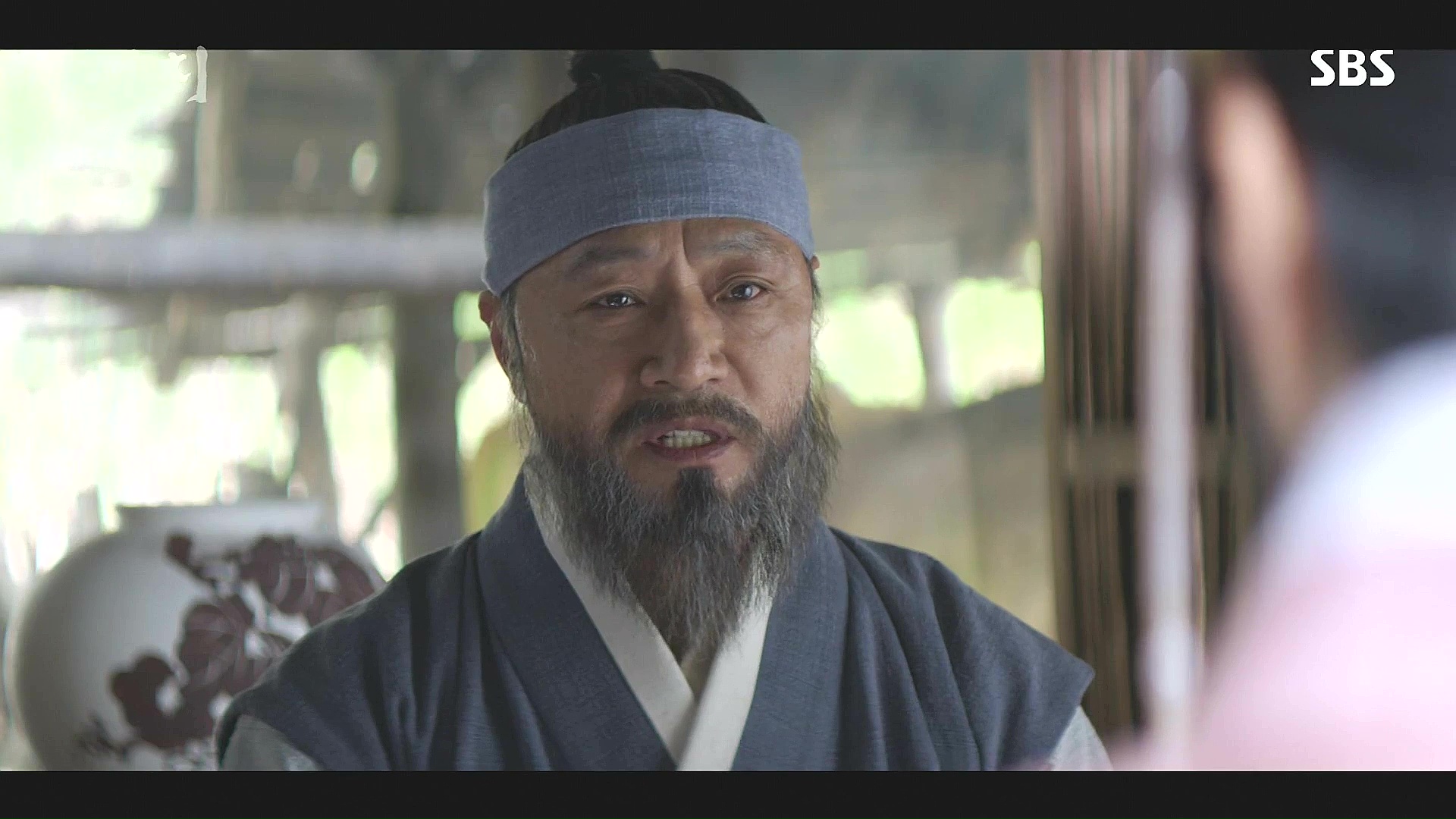
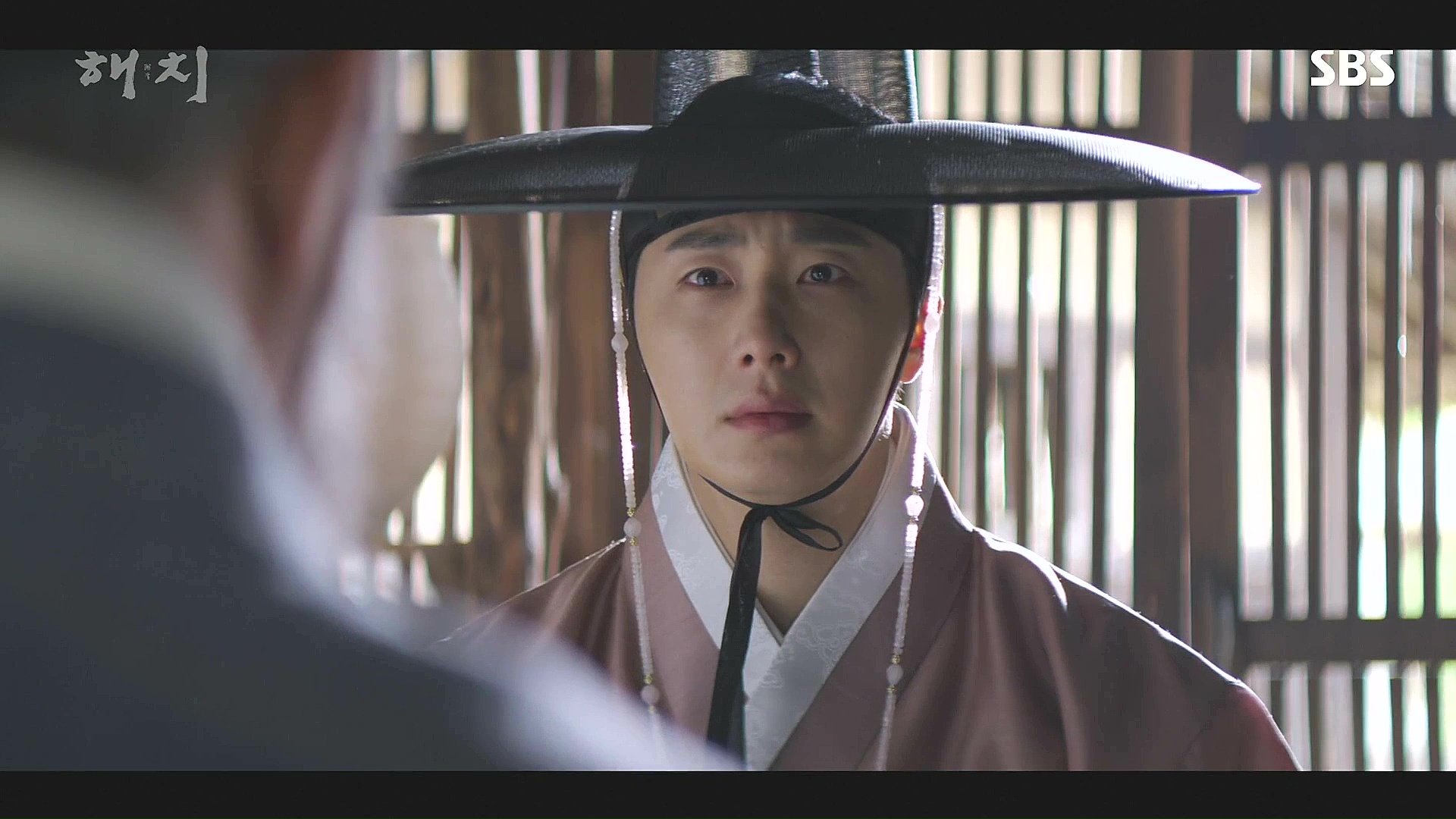
He recalls that once, he told someone that the Haechi, the legendary beast that differentiates between good and evil, is impossible in the real world. He says that he once thought there were only winners and losers, and that losing power meant that he would die. But now he knows that politics is about dreaming the impossible and progressing one step at a time.
He tells Yi Geum that one day, even he might get exhausted and disappointed and have to take a step back, but he sincerely hopes that that day comes as late as possible. Yi Geum leaves, and he turns back and bows with respect, while inside, Minister Min gets on his knees and deep-bows to his king.
As Minister Min goes back to his pottery, he says in voiceover, “It’s because you are not alone. You are surrounded by friends who share the same dream.”
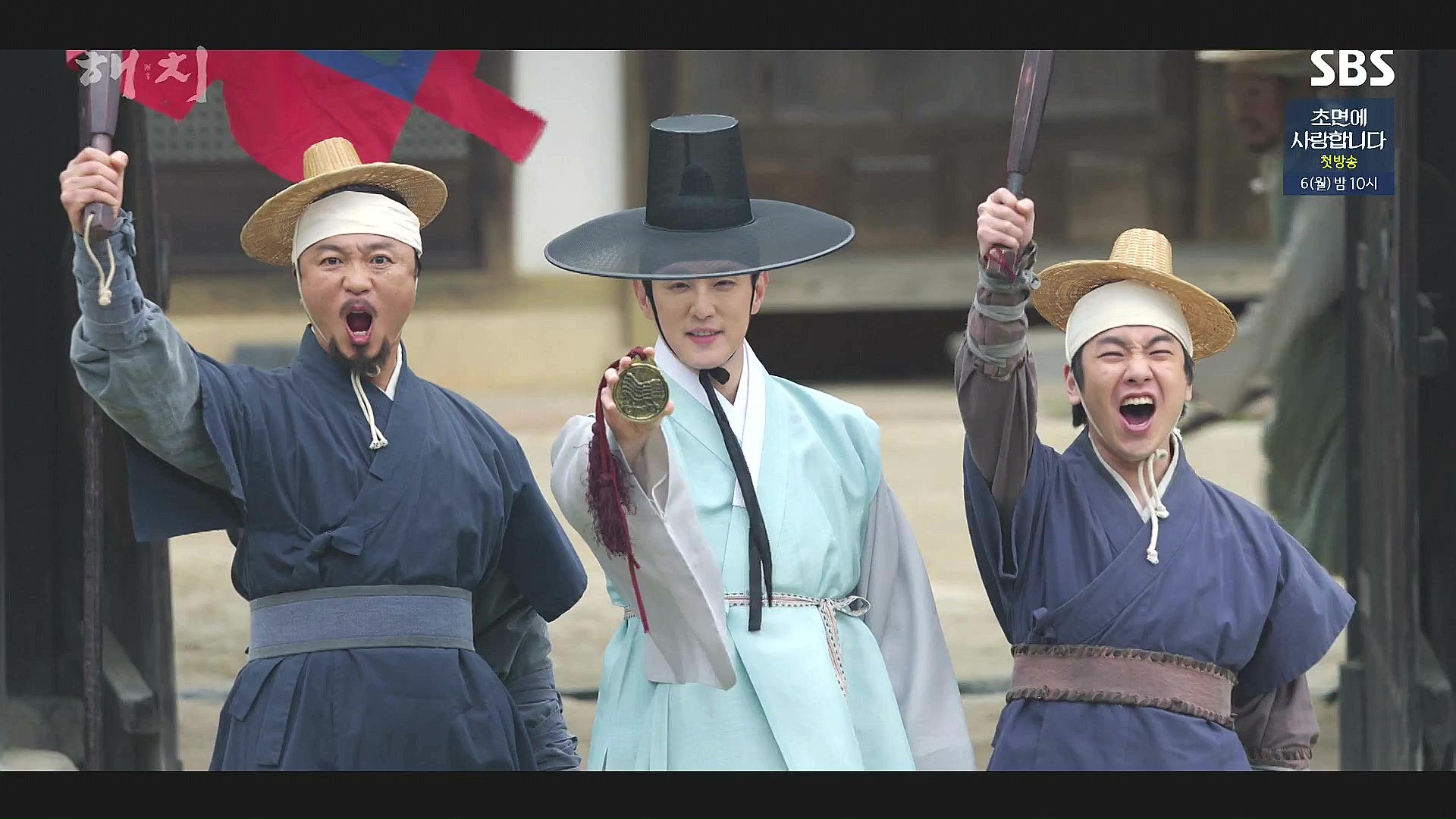
Those friends, Moon-soo, Jang-dal, and Ah-bong, burst into Officer Choi’s home like badasses to arrest him… but Moon-soo stops to rummage through his clothes for something. LOL, Moon-soo, never change. He finally finds what he’s looking for, his royal inspector badge, and he announces that Officer Choi and his cronies are dead meat.
As Yi Geum walks home, he thinks about Minister Min’s last words to him. He comes upon Yeo-ji, dressed in regular clothing and outside the palace. She says that Yi Geum is always in meetings and asks if he’s tired, but he says the king should be tired. He takes her hand and says that this is why he leaves the palace, awww.
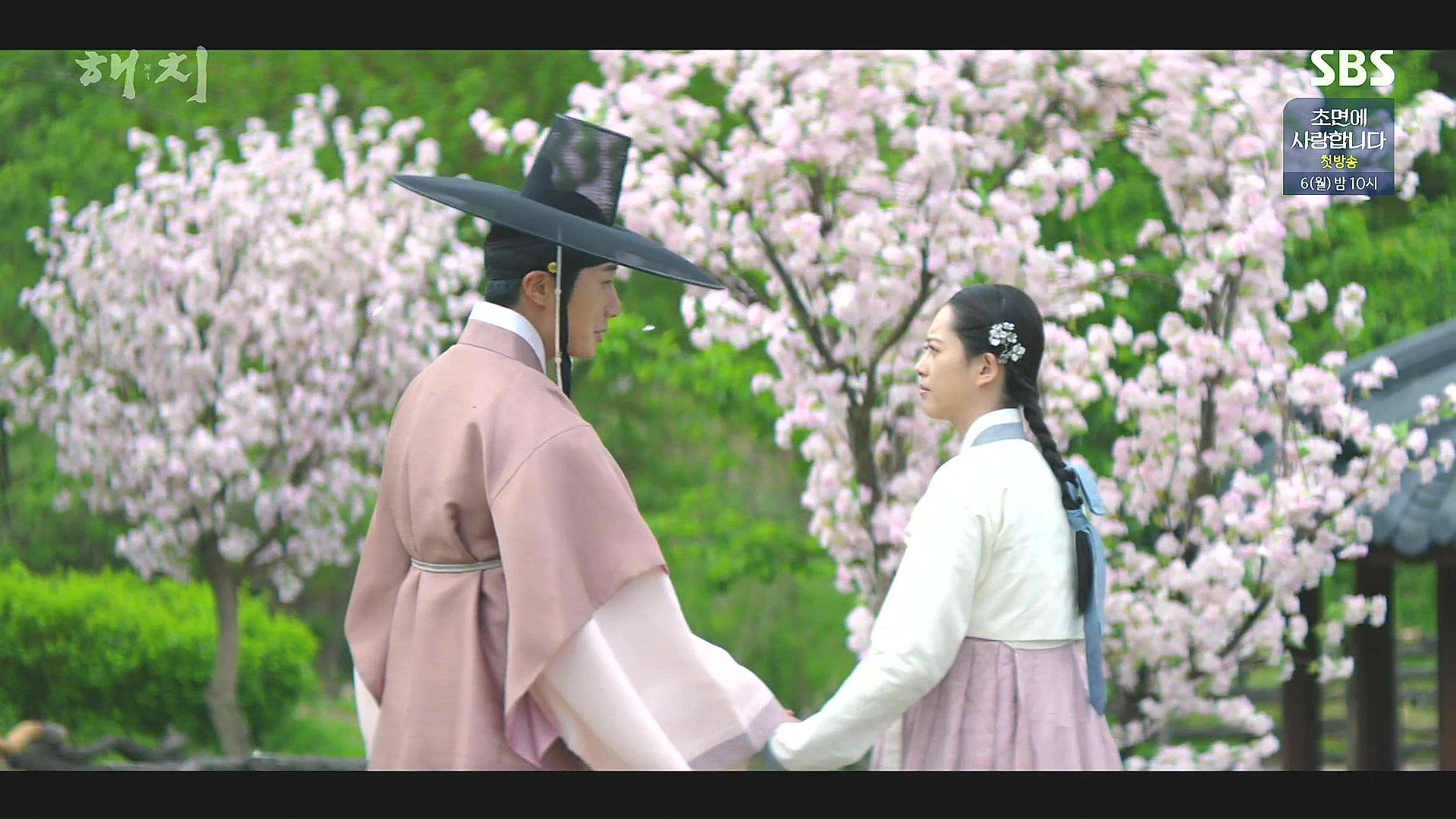
He tells her not to worry because nobody is around to see them canoodling, then jumps guiltily when Ja-dong approaches, hee. Yi Geum suddenly notices that a nearby bridge needs repair and tells Ja-dong it needs replacing, but Yeo-ji points out that a bunch of people live just under the bridge.
Right then and there, Yi Geum jumps down to ask the people what they think, leaving himself without guards. He ignores Yeo-ji and Ja-dong’s protests, walking among the humblest of his people to ask them questions about the bridge.
Yeo-ji watches him with a proud smile on her face, and at one point he looks up to return her smile. He thinks to himself, “As I walk this road, I hope I will not easily get exhausted or disappointed. After all, both life and politics is about slowly progressing one step at a time.”
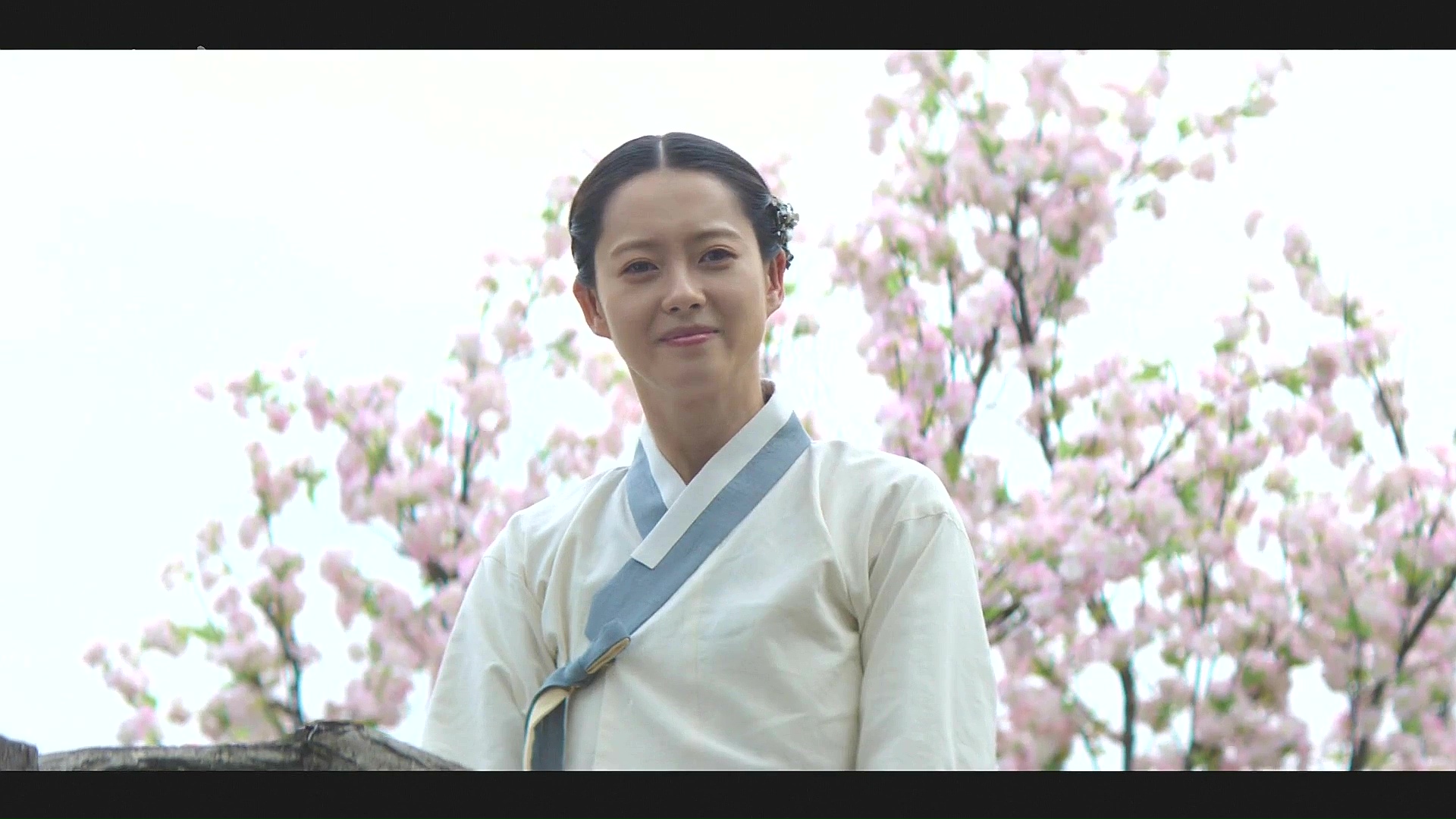
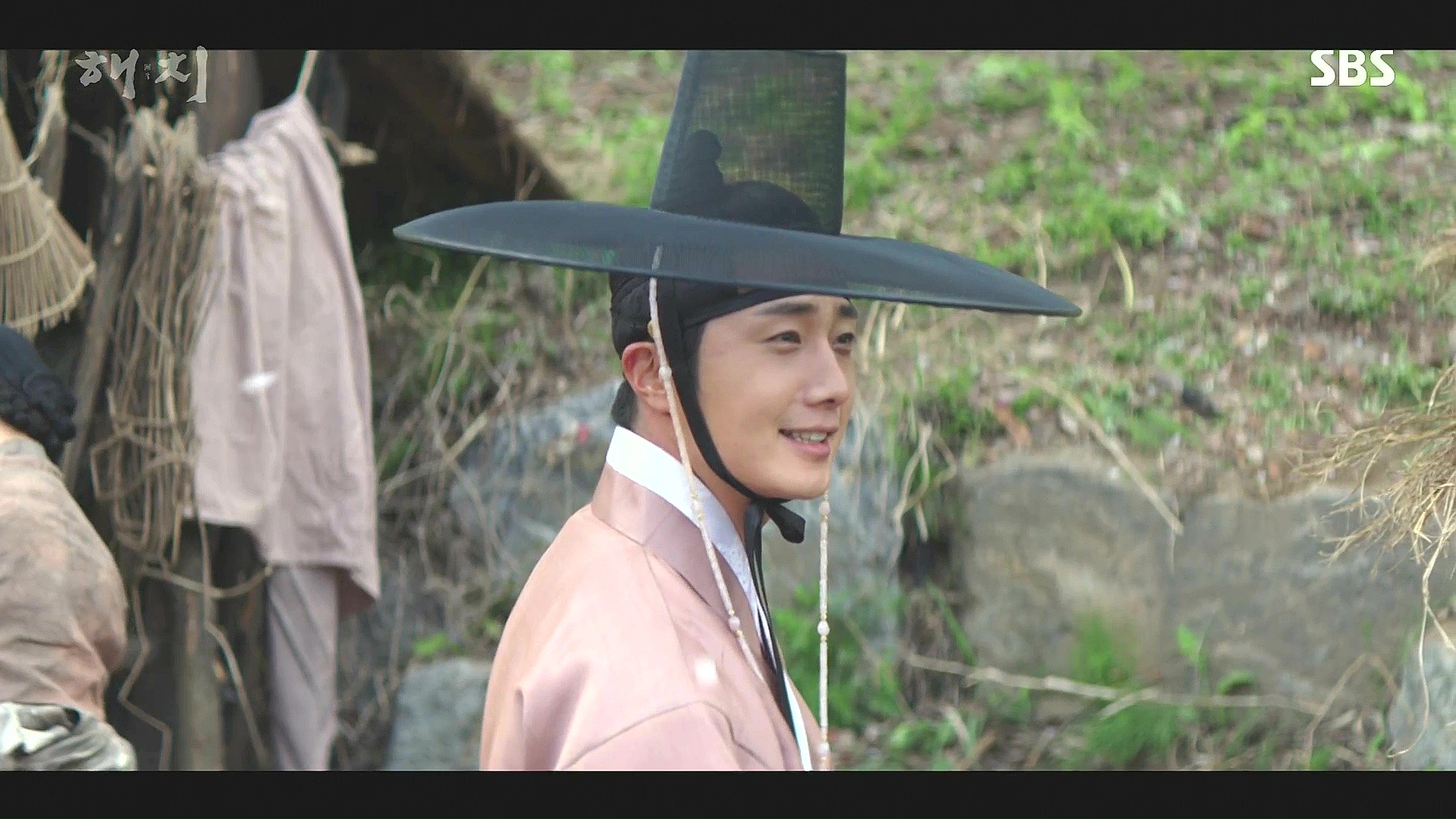
COMMENTS
What a lovely, hopeful ending to Yi Geum’s story of how he became the king that the people needed, the king that he himself could respect. I just love that he never stopped hoping and dreaming, no matter what anyone said, and how he never forgot what truly made the kingdom — not the king, but the people. Yi Geum managed to earn respect from those he respected, even and especially the people who used to fight against him, because he lived by example and treated everyone else with respect at all times. I also greatly appreciate that everyone got a little send-off without feeling like the show was ticking down a list to make sure nobody was forgotten — seeing each person and what they’re doing now felt natural.
The last thing that Yi Geum said to Yi Tan really resonated with me, and made their final confrontation meaningful and not just about revenge or winning — that if he’d been capable of making the scary, hard decisions earlier, then he might have become king. It’s true that Yi Tan never acted like a king who could make such decisions reliably, while Yi Geum was making those decisions instinctively all along, even when he was nothing but a prince acting out from boredom and disappointment. It showed that Yi Geum is aware now of what makes himself a capable king, and that he finally understands that he’s come a long way from the insecure, frightened man he used to be. I also appreciated that he didn’t say that to Yi Tan to make him feel bad, or to hurt him — in fact, he said it with a lot of compassion and caring, as if it hurt him to say it as much as it hurt Yi Tan to hear it.
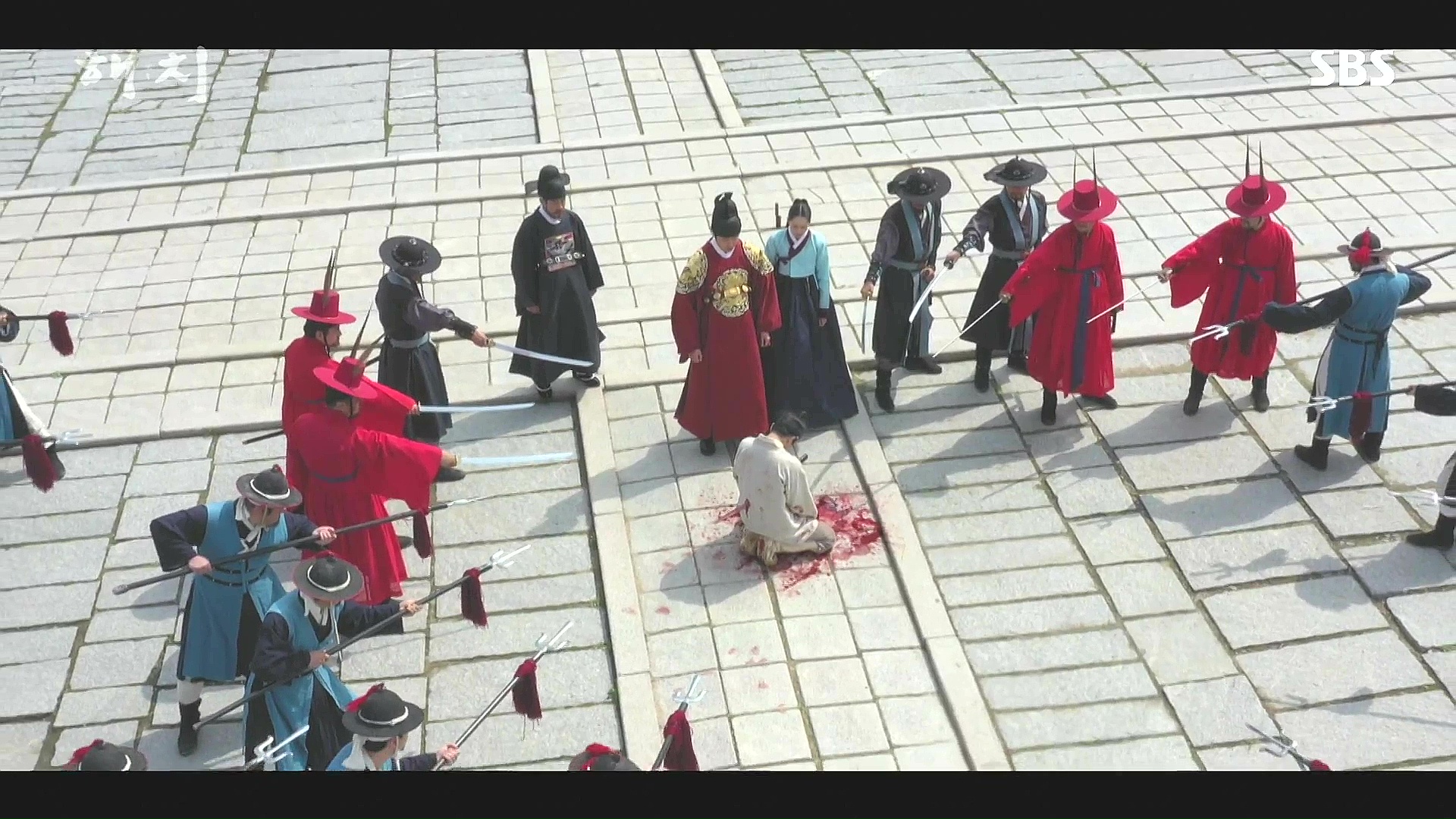
It’s another sign of what makes him a great king, that he does what needs to be done even if it’s difficult for him, yet he doesn’t harden his heart to the impact his words and deeds have on others. But I’m also glad that we got to see the vulnerable side of Yi Geum that’s still there, and still scared, and still worried that he’ll be a bad king. It’s the people who worry that they’ll fail that care the most, and who usually do the best job even when they’re afraid they’re messing it up. We know that King Yeongjo was this sort of man all throughout his reign — he blamed himself when things went wrong, and reflected and tried to be a better man and a better king. From what we know of him, I feel that Jung Il-woo (and the writer) did a faithful job portraying Yi Geum/King Yeongjo as the kind of thoughtful, conscientious, and caring man that history says he was.
And you know, against everything I would have said up until this finale, I actually respect Yi Tan for going out like he did. He wanted to die with dignity, like a king, even if he couldn’t live as one, and I actually think he did the best thing he could have done under the circumstances. He saved himself from torture and a humiliating execution, and went out on his own terms. As Yi Geum said, if he had been able to make hard decisions like that from the start, he really could have become king. I hated Yi Tan at the beginning of the show, and I hated him at the end, but in the middle I somehow picked up some pity for him as someone who’d been abused and twisted by people who took advantage of his impressionable nature. I felt that Yi Tan’s murders were less about any joy he found in killing, but a desperate attempt to get people to respect him. That doesn’t make it right, but it does make it a shame and a waste of a life.
You know, I was very excited about Haechi before it aired, then I really struggled to stick with it for a while — mainly lighting issues that made it difficult to tell which ministers were which, and the fact that it’s clearly written for an audience that already knows the basic history, which I did not. But once I sat down and just took some time to educate myself on King Yeongjo and Park Moon-soo and a few other historical figures depicted in the show, it got a lot easier and I’ve really enjoyed seeing the history play out. Aside from compressing the timeline a bit, Haechi showed a relatively realistic dramatization of how things may have happened, and the characters seem very much as they are remembered in the history books, even down to details such as Park Moon-soo not passing the civil service exam until his mid-30s. Thankfully, once I stopped being confused and was able to enjoy the show, I really enjoyed seeing Yi Geum’s rise from minor inconvenient prince to one of the greatest kings in Joseon history.
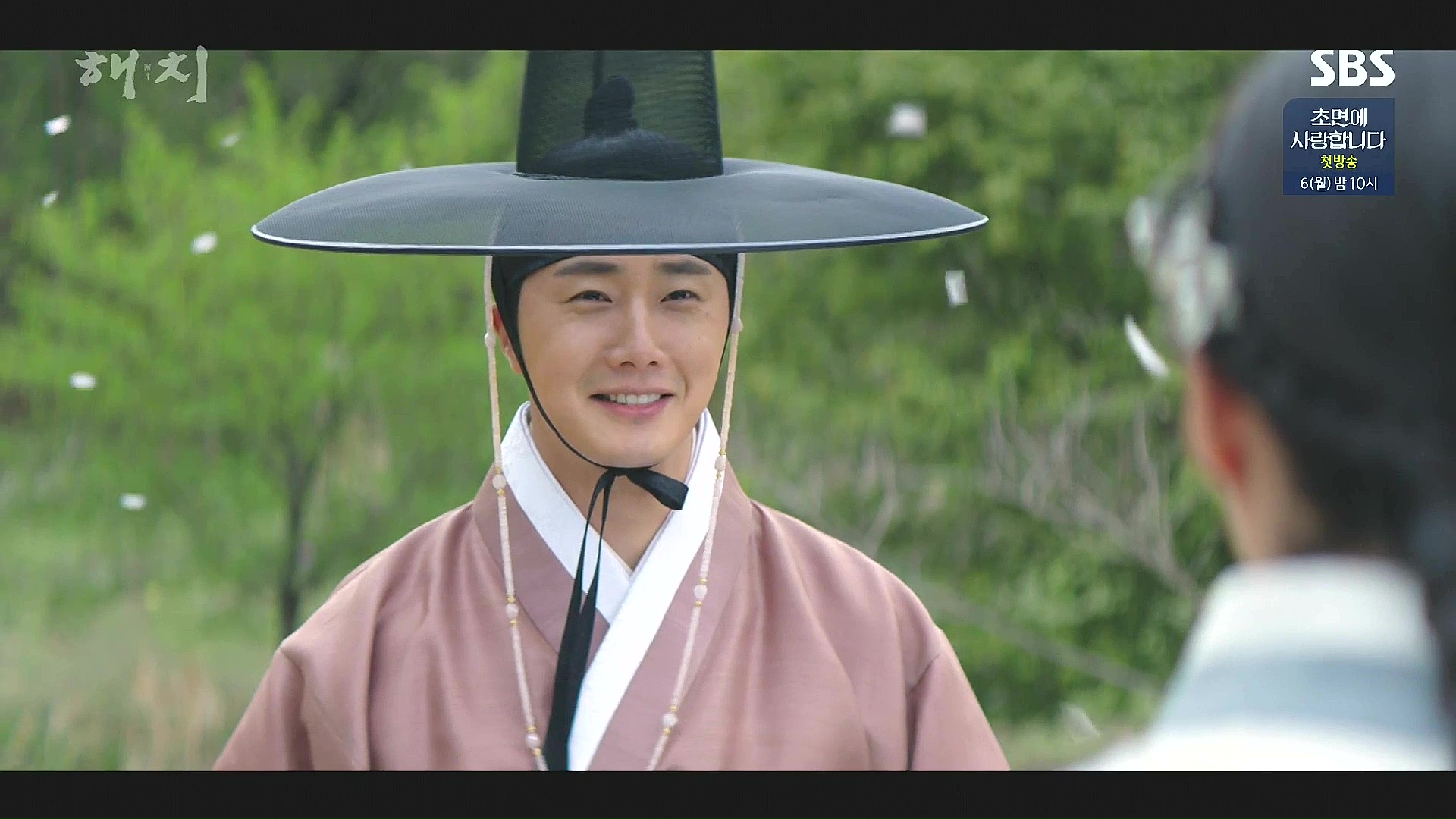
RELATED POSTS
- Premiere Watch: Haechi, Item, The Light in Your Eyes, The Fiery Priest
- Jung Il-woo defies all odds to become king in SBS’s Haechi
- Haechi stars Jung Il-woo as a problematic Prince Yeongjo on quest for justice
- Haechi as the judge of good and evil in SBS fusion sageuk
- Jung Il-woo confirms comeback in drama Haechi with Go Ara and Kwon Yul
Tags: Go Ara, Haechi, Jung Il-woo, Kwon Yul, Park Hoon
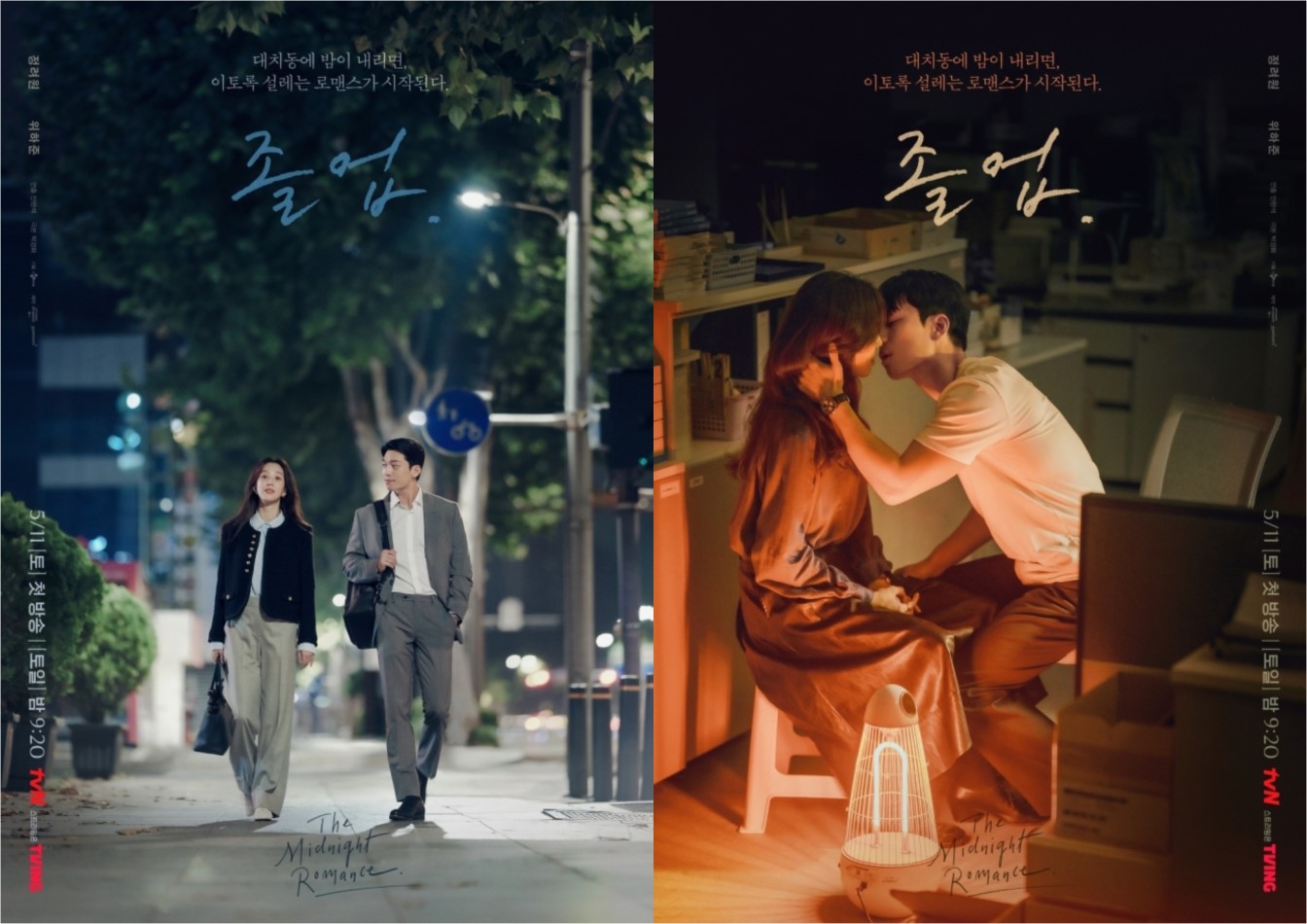

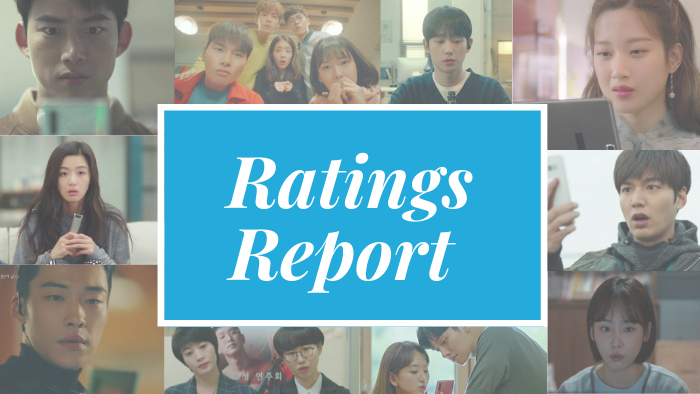
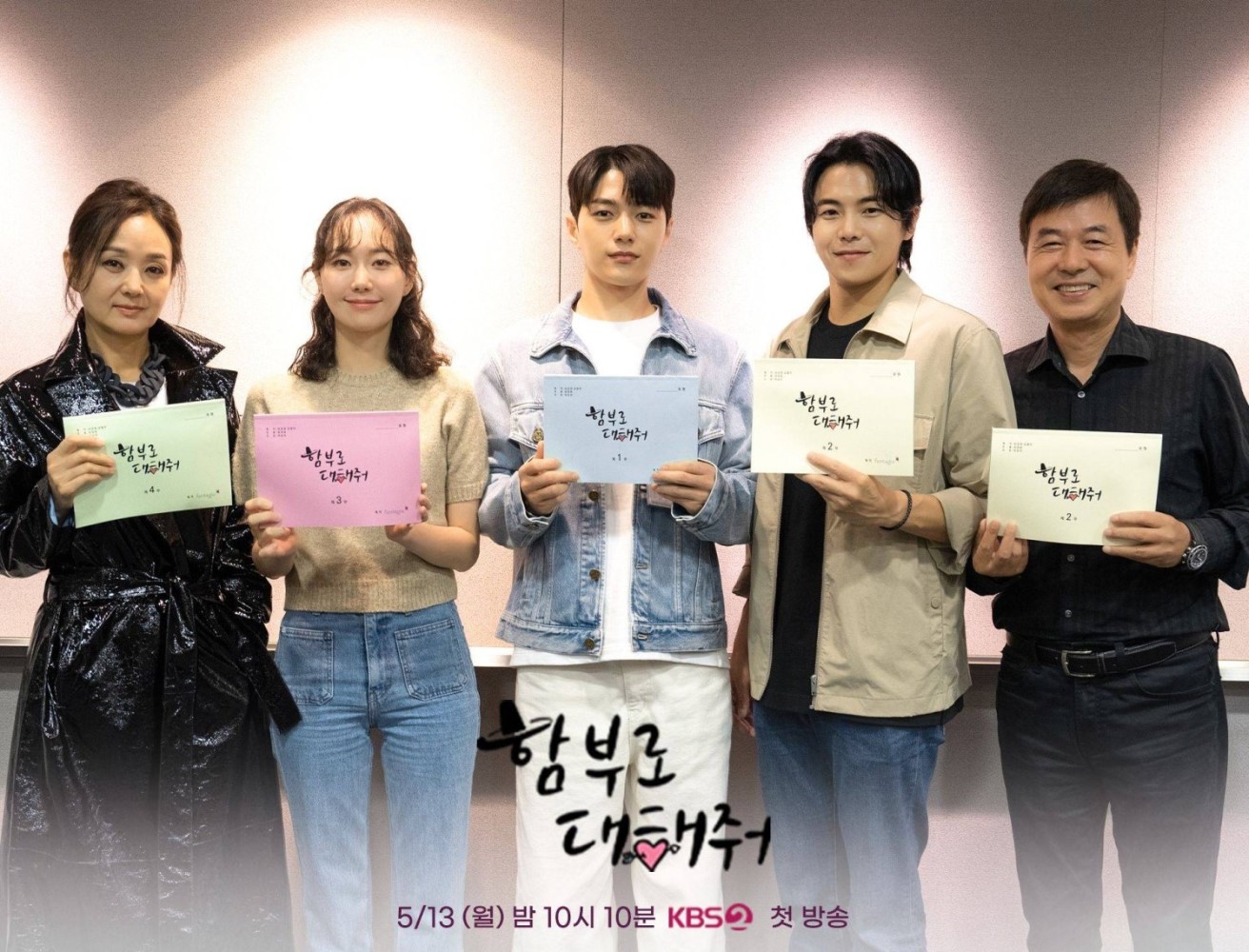
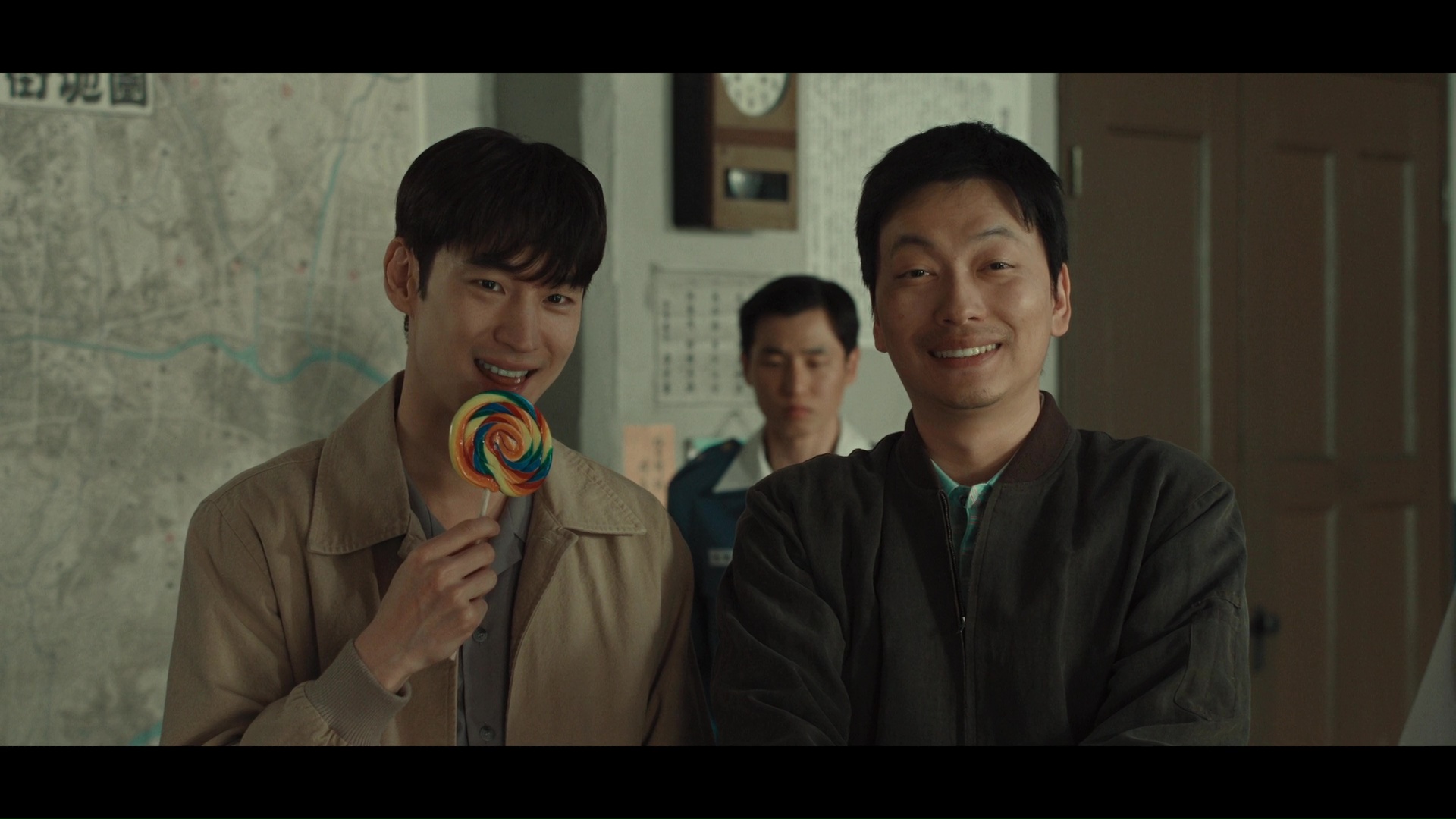
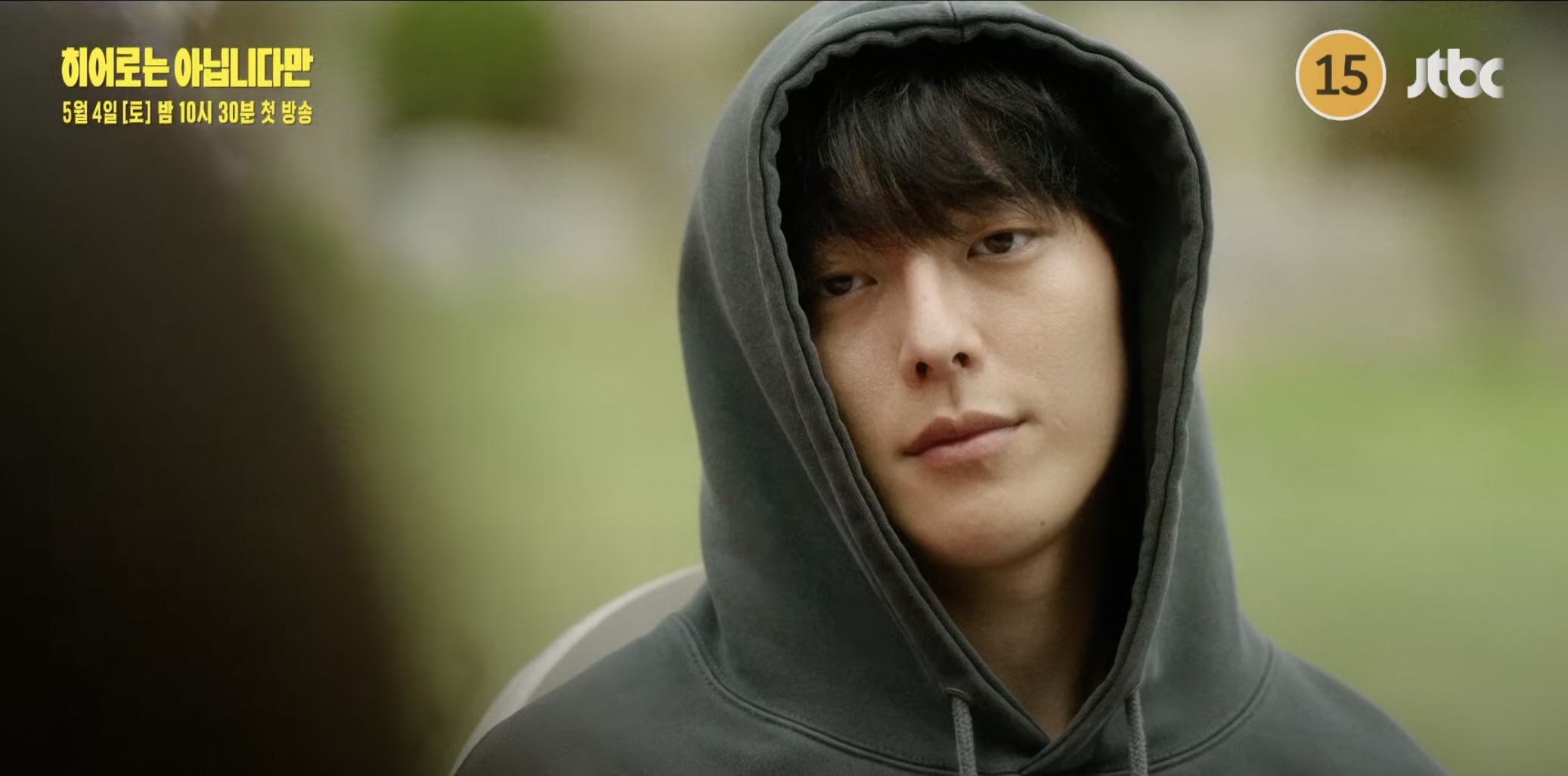
![[Drama Chat] The mysteriously disappearing desire to watch](http://d263ao8qih4miy.cloudfront.net/wp-content/uploads/2023/10/didiva_5-scaled.jpg)

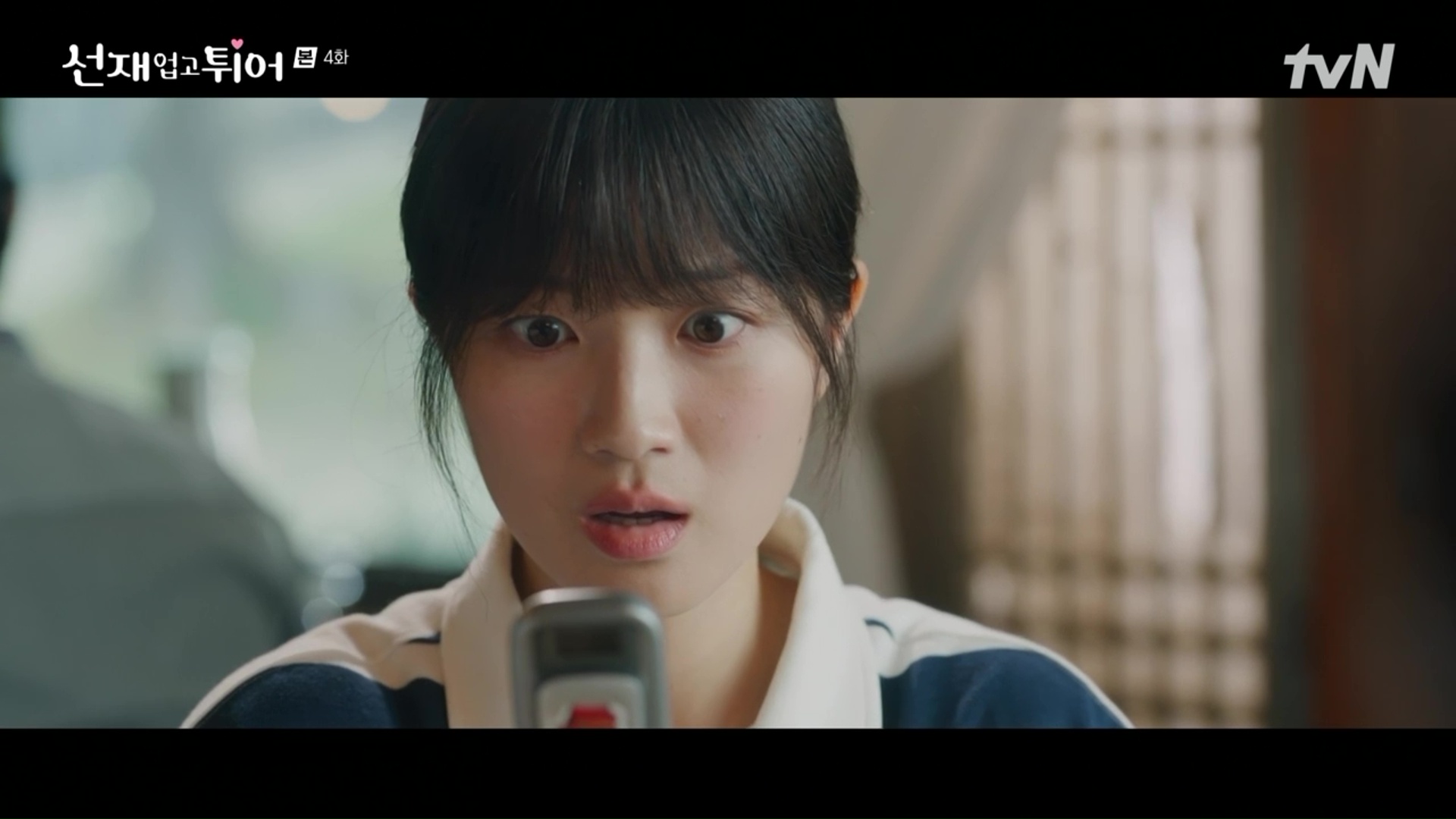

Required fields are marked *
Your email address will not be published. Required fields are marked *
1 Linda Palapala
May 7, 2019 at 9:40 AM
Thanks for the recap and comment - now you've made me want to not only watch the drama but read the history. Well done.
Required fields are marked *
2 gadis
May 7, 2019 at 9:41 AM
What a beautiful ending for a thoroughly satisfying show. I think this is the first time I love a non-fantasy sageuk from beginning to end. It's a very apt ending for our forward-thinking king: the beginning of massive and systematical change in the country, the new generation started taking over many influential positions, while both his old and new supporters finally learned to stand together for a better Joseon. It's the dawn of a new era, and I can see how Yi Geum will rule for a long time as one of the greatest king in Joseon.
I especially love the fact that until the very end, even after his resignation, Min Jin-heon is still the one who bring our king a grim reality check. He cautioned Yi Geum about what it truly means to do politics for a long time. And yet, he also sincerely prayed for Yi Geum that the exhaustion will come much later and very very slowly. This unexpectedly touching send-off reminded me of what a great advisor this man is and that Yi Geum is lucky to have Min Jin-heon opposing and also assisting him in his early days as ruler.
Required fields are marked *
mistyisles
May 7, 2019 at 10:38 PM
I also loved that balance that Min Jin-heon brought to the show, that he never lost his understanding of the harshness of reality, but that he was also newly inspired by Yi Geum's hope for the future.
Required fields are marked *
3 sparks121
May 7, 2019 at 10:59 AM
Thanks for recapping this. Thoroughly satisfying. Give me more sageuks like this! Moar! Kind of gave me the fictional-but-not-really-fluff mbc sageuks of the 2000s feels(but better than some of those...*cough the legend and dong yi cough*).
Required fields are marked *
4 ys
May 7, 2019 at 12:41 PM
That deep bow by Minister Min was so powerful and touching. There is no greater expression of respect and gratitude even still today. That should have been the show's closing scene. Because for me, this story was about this, about the king gaining the trust of Minister Min and being the hope for the future that the minister wanted for the people.
Though I don't mind that they ended with the cute.
Required fields are marked *
5 신류지
May 7, 2019 at 6:35 PM
Ok so I know it's not really Go Ara's fault since she got injured, but anyone else really think that the absence of her spunk and martial arts shown in the first few episodes was pretty noticable? I know that they had to quickly revise the scripts but I felt like because of that, she couldn't do as much action scenes, and therefore be constant with her first shown badass personality. And because I knew that she was injured, it was really noticable that she did not move at ALL afterwards in the episodes. And because of her injury, I felt like the romance was a little forced because she couldn't move. Again, I know it's not her fault but I won't lie in saying that I was a little bit disappointed. Granted, I do hope she feels better and I hope she's ok!!
Required fields are marked *
6 sazttkktt
May 7, 2019 at 9:56 PM
Thanks LollyPip
Really loved the show and actually wished we have another 20 episodes to continue Yi Geum's journey with him
Required fields are marked *
7 mistyisles
May 7, 2019 at 10:34 PM
Thanks for the recaps, and your lovely comments at the end! I loved this show from beginning to end, and for me this final episode was one of the few perfect drama endings. I was so scared that in the last few weeks the show would kill off one or several main characters, but I'm glad it kept things more hopeful than that. I also kept wondering exactly how they were going to close out the final episode, and I really liked the ending scene being Yi Geum seeing a problem and immediately running to ask his beloved people what they thought he should do about it -- it really emphasized his attitude as king and the development of his character.
Like many, I wasn't necessarily invested in the romance, and it's a shame we'll never know how that would have turned out if Go Ara hadn't been injured. But I didn't hate the end result. Just when I would start to think that I didn't care much about the romance, Yi Geum would give Yeo Ji these looks of utter adoration, and I would just melt. I might not have chosen Yeo Ji for him, but I can respect that they chose each other and are happy together.
Required fields are marked *
8 doubt_no_more
May 7, 2019 at 10:46 PM
Thank you for this lovely recap.
Although this drama has things that made me mad, but I can finally say it will be one of my favourite saguek. One of the reason is because it is the journey of Yi Geum, and since I am a fan of Dong Yi, Yi Geum's story is something I immensely enjoy.
Now this drama has ended, I am currently looking to fill in my empty saguek heart, and have yet to found one because Jung Il Woo makes it harder to find someone as charismatic and at the same time looking vulnerable and gentle like him. Maybe I just miss his portrayal of King Yeongjo. I really really really love him as Yi Geum.
Sadly, Go Ara really got the short end of the stick. Throughout this drama I keep wondering why the writer wrote this character, especially it would be harder to see her interactions with Yi Geum once he is involved with the court (I am a fan of Yi Geum and Yeo Ji's romance). With her being injured, it was almost gone. Moreover, her character is a fictional character which made me wonder how the writer gonna conclude their relationship, and as I expected it was going somewhere and going nowhere.
Because of that I thought the writer might as well make Go Ara as Yi Geum's lawful wife since the beginning and make her as someone that supports her husband, like Jin Se Yeon's character in Grand Prince. She doesn't have to be badass warrior to stay by his side, and still having a good amount of screentime and contribution towards the story. I am not saying she was bad as Yeo Ji, but I am kinda sad their relationship was concluded that way (if that is called as conclusion). Nevertheless, I enjoyed their banter and conversation, something that lighten the mood in overall dark and heavy plots and schemes.
Watching Yi Geum's story feels like watching your own kid's growing up (did I mention I am a HUGE fan of Dong Yi, and by extension her relationship with her kid in that drama?).
So kudos to the production team and everyone involved for reviving my sageuk's heart.
Required fields are marked *
9 PakalanaPikake
May 10, 2019 at 12:12 AM
Part 1 of 2
Manseh, @lollypip! Thank you so much for recapping HAECHI in its entirety. It has truly been a pleasure to read your detailed play-by-play and interpretations. You are zzang!
The drama is an interesting retelling of Yi Geum’s rocky road to kingship and the people he encounters along the way. It is a treat to watch him evolve from timid half-royal hiding his talents under the protective coloration of simulated frivolity to confident, enlightened ruler whose renovations of government policies and procedures spawn practical effects that ripple out across the land. He remembers his roots and uses that firsthand knowledge to address the endemic abuse of power that plagues the nation, its institutions, and all levels of society. (Sadly, we know from history that, despite his efforts at lasting reform, the inequities of Joseon society and government will lead to future uprisings and the dynasty’s eventual collapse as depicted in MR. SUNSHINE and NOKDU FLOWER.) Jung Il-woo has done a splendid job of bringing King Yeongjo to life in a top-notch performance that memorably marks his return from military service.
What is noteworthy about the power issues in HAECHI is that they affect people at all levels of society. If even kings and princes are subjected to merciless, often fatal, opposition, what recourse do impoverished nobles, commoners, cheonmin (“vulgar commoners”), baekjeong (“untouchables”) and nobi (slaves) have in the face of oppression?
A few things rankle me. Minister Min, despite his many earlier crimes, retires from court to make porcelain and gets away scot-free. His Soron counterpart, Chief Justice Jo, likewise skates by on his earlier evildoing. I can only guess that Yi Geum gives the Eventually Loyal Opposition leaders a free pass. Their initially-grudging support enables him to achieve his dreams and visions for Joseon. I’m not keen on their getting away with actual murder, but that’s the breaks.
I’d like to commend the actors who portrayed the main villains in HAECHI. Kudos to Lee Kyoung-young (Minister Min Jin-hun), Jung Moon-sung (Yi Tan), Han Sang-jin (Wi Byung-joo), and Ko Joo-won (Lee In-jwa). Bae Jung-hwa was in a class by herself as queen-wannabe Cheon Yoon-young. I especially appreciated the contrast between In-jwa and Byung-joo when it came time to pay the piper. (Color me stunned that the rebel leaders are not dismembered. Maybe this is part of Yi Geum’s kinder, gentler policy of dealing with the aftermath of the uprising.) In-jwa met his fate with quiet fortitude, as demonstrated by his erect posture, while Byung-joo’s slumping and slouching spoke volumes about his unwillingness to take responsibility for his actions right up to the bitter end.
- Continued -
Required fields are marked *
10 PakalanaPikake
May 10, 2019 at 12:19 AM
Part 2 of 2
The craven cowards running the Saheonbu seem to have gotten off lightly, too. By rights, they should have been jailed (at least) for their earlier abuses of power and efforts to dethrone Yi Geum when he was Seja. They are still at it when they arrest and torture rebel leader Lee In-jwa’s father-in-law in defiance of Yi Geum’s edict against collective punishment. Just once, I wish they’d get a taste of their own medicine, dang it.
I was glad to see the flashback to Saheonbu Inspector Han Jung-seok (Lee Pil-mo), whose accidental death at Byung-joo’s hands had long since sealed the latter’s fate. I’m still scratching my head as to how he managed to dodge that death sentence for so long.
Ever the smitten romantic, Dal-moon sends Yoon-young off to the Happy Hunting Ground in a water burial reminiscent of the Lady of Shalott. https://www.poetryfoundation.org/poems/45359/the-lady-of-shalott-1832; https://en.wikipedia.org/wiki/The_Lady_of_Shalott_(painting) I’ve posted Loreena McKennitt’s luminous setting of Tennyson’s poem on my fan wall. Like the weaver in thrall to a mysterious curse, Yoon-young was doomed by events beyond her control as a child – and by her later reactions to them. http://www.dramabeans.com/members/pakalanapikake/activity/768177/
That is a nice fake-out during Yi Tan’s swansong at the palace. It really seems as if Yeo-ji would save Yi Geum’s life in a parallel to Yoon-young’s demise, but the deranged usurper pulls a fast one. It shouldn’t have surprised me at all, as Yi Tan has well and truly lost everything by the time his concubine breathes her last. In the final analysis, he has never stood a chance. He has been used as a pawn since he was small. What a waste of an intelligent mind.
As for Yeo-ji herself, Go Ara’s injuries took the wind out of her character’s sails. In my mind’s eye, she’s right there with her Saheonbu comrades striding out of the smoke to attack the final rebel stronghold. Now that HAECHI is over, I wish her a good, solid recovery. I admire her professionalism, and hope to see her in another action role, which I think is a good genre for her. Hwaiting, Go Ara!
Thanks again, @lollypip and fellow Beanies, for sharing your thoughts on HAECHI. I really enjoyed this sageuk and our own stalwart camaraderie. ;-)
-30-
Required fields are marked *
11 Priscila
November 30, 2020 at 10:14 PM
It was an emotional journey, watching our naughty prince transforming himself into a mature and charismatic king who was very loved by the people. Growing up as an underdog Prince, he faced lots of prejudices and mistrust. But instead of blaming them, he understood, because he couldn't trust himself. He usually put himself in the other person's shoes, lowering himself, and tried to come up with a solution that benefited most. He respected people (from all kinds of walks) and listened to them. He never thought he was all that. Rather, he was always ready to learn from others. By thus doing, he broke the walls of mistrust, and allowed others to respect and admire him. Winning over the greatest enemies.
Minister Min was the epitome of this. He started off being his greatest enemy, one who sent an assassin to kill the Prince. But later, the older man stopped fighting the king because he understood the king's great vision and it reminded him of when he was young with dreams. So much so that he changed his own philosophy. Life and politics was no longer a power game. He knew the nation was in good hands, so he was at peace retiring.
The king also learned from the old man's wisdom. He listened to the old man telling him the king is too idealistic, that reality will hit one day and he will know equally in politics is an unattainable dream. But Minister Min was not being pessimistic in his admonishment. He was still encouraging the king to continue dreaming and fighting for equality. Hard as it is, the king is surrounded by many such dreamers, so it may take longer till the crude reality hits. Meaning: Minister Min saw hope in this young king.
And the bowing down to the young king, as they bid farewell, was filled with so much mutual respect.
A beautiful ending...
Required fields are marked *